#Physical Requirements For Group-VI
Text
#Best tnpsc information#Forest Apprentice Exam#Forest Service Job Opportunities#Physical Requirements For Group-VI
1 note
·
View note
Text

decided to indulge in my 14 year old self's obsession with winx next gen ocs and finally design a whole group of them!!
character sheets and descriptions + doodle dump under the cut!

Blaire
21. Daughter of Bloom and Sky. An Alfea graduate, Enchantix fairy, Guardian Fairy of Eraklyon and Heir of Eraklyon's throne. Basically a burnt out overachiever and perfectionist who shouldered everyone's high expectations due to being Bloom's daughter, and had high hopes for the future but is now barely trying to hold things together. She can be a little intimidating and hotheaded, but that's because she's very tired.
She's cordial exes with Luke, Stella and Brandon's son, but they still remained best friends. She's currently dating a wizard named Ike.

Lucian (Luke)
21. Son of Stella and Brandon. Crowned Prince of Solaria who has recently taken on more responsibilities as the de facto new King of Solaria now that he recently came of age—but...he doesn't really want to be called a King quite yet. He's a charming and responsible young man who's inherited his mother's love and passion for fashion, and is a little snobby about it sometimes, much to his friends' chagrin.
He's cordial exes with Blaire, Bloom and Sky's daughter, but they still remained best friends. He's currently single, but there isn't a day where he isn't talking to or seeing someone.

Violet (Vi)
21. Daughter of Flora and Helia. Guardian Fairy of Linphea and a reputable freelance photographer who's a bit too chill for her own good. She can be nonchalant and a bit too cool headed at times it freaks people out, but it's quite handy for her job and hobby as a photographer, requiring precise focus to capture the best photos. She's also a deeply sentimental person, capturing and treasuring all memories of her family and friends through photography.

Maxine (Max)
21 years old, daughter of Musa and Riven. Formerly an Alfea student and a fairy-in-training, but have shifted to Red Fountain to pursue being a Specialist. She turned out to be a skilled prodigy, and now teaches at Red Fountain part time. She's a chill and easygoing person, and is well liked by everyone in the school, even capturing some people's hearts. Despite this, she can also have an explosive temperament if certain buttons are pushed.
On a long term relationship with her former roommate Tesla, Tecna and Timmy's daughter. They go way back, since Alfea.
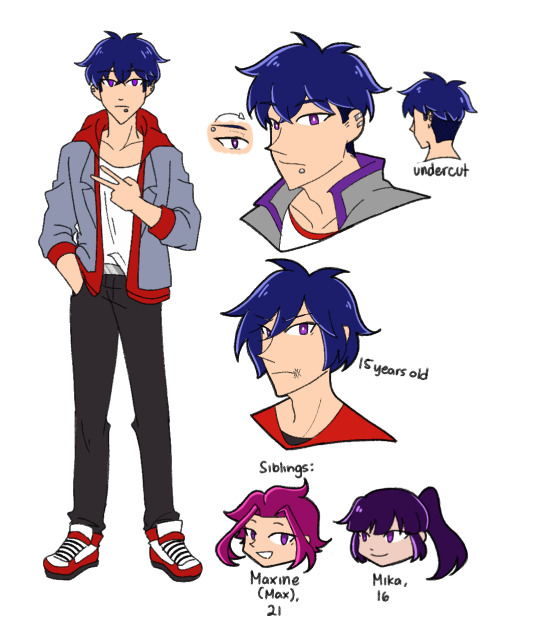
Riley
20 years old, son of Musa and Riven. He's a quiet and chill guy who's had a bit of a troubled past. He went to Red Fountain alongside his sister but he mostly did it to appease Riven, and has no interest in being a hero, instead preferring to pursue his interest in music. He looks a little scary to some people, and he used to have a notorious reputation, but he's passed that now.

Tesla
21. Daughter of Tecna and Timmy. A gifted tech genius who dropped out of Alfea to defy expectations and pursue her passions, and now works as a reputable robotics engineer in Zenith's government. Her demeanor is generally blunt and sarcastic, which is off-putting for most people, but she mellows out around people she's comfortable with.
On a long term relationship with her former roommate Tesla, Tecna and Timmy's daughter. They go way back, since Alfea.

Amir
21. Son of Aisha and Nabu, and the wizard prince of Andros. A reliable and approachable young man who gets along with everyone, and is actually in talking terms with everyone in the friend group despite the incident. He's also a very physically active person, and despite being a formidable wizard, he still chose to take some combat classes in Red Fountain. Behind his easygoing demeanor is a cunning and strategic mind that should not be underestimated.
--
+ some more doodles about the TxT and MxR kids because can you not tell that tecna and musa are my winx meowmeows


#winx club#winx next gen#winx club next generations#winx bloom#winx stella#winx musa#winx tecna#winx aisha#winx layla#apologies gnshn and bg fans for no content btw#clearly ive been indulging in this#but dw im cooking something up for yall too
33 notes
·
View notes
Text
a lesson on style - i . [ ljn | njm ]

pt. i, pt. ii, pt. iii, pt. iv., pt. v, pt. vi
you’ve always been content with being associated with one word and one word only: average. average in looks, academics and social skills, you’re just looking to graduate high school without causing disasters you’ll have to live with until you kick the bucket. when you’re paired with school king lee jeno for the semester-long physics thesis, you can’t help but think the entire situation has pretty much set itself up for failure. that is, until you strike a deal with your partner.
alternatively: an au tale involving lessons in popularity, eleven consecutive B minuses, a secretly sensitive, chess-loving jock, and an amateur sex tape.
pairing: jeno x fem!reader, jaemin x fem!reader
verse: high school au { jocks!nomin ft. a super cute whiny ap physics genius renjun }
rating: M
chapter warnings: none
word count: 6.1k
author’s note: this is actually an old exo cast fic of mine from my old blog that i had to put on hiatus (alongside myself, actually), for many, many terrible moons (see : 3 years, for a master’s diploma that is simply collecting dust), but upon re-reading it, i thought that it would be a pretty good fit for a dreamie cast instead!! i’ve been thinking about branching out and writing for different groups for a while now, and as a slow return to writing, i’ll be posting the edited already written chapters up slowly so i can also write ahead! for anyone who might have found this blog and recognizes this fic, welcome back! i hope you still enjoy it! for people who’ve encountered it for the first time, i also hope you enjoy it! :) this is unbeta’d (even after all this time pls), so please do point out any errors i might have missed while editing!
*:・゚✧*:・゚✧
There are three things you had intended for your very average, simple, girl-next-door life:
1. Graduate high school with an average GPA, a diploma and a sigh of relief, without any type of valedictorian honors or the requirement to make a teary/educational/sentimental/hopeful speech about the past/present/future.
2. Get a desk job as the vice-vice-vice senior-vice president of an average paying company, pushing papers and typing numbers you don’t fully understand into a pirated version of Microsoft Excel 2000 to be able to pay your not very steep rent and eat take-out every other night.
3. Get married to an average-looking guy either named Jaehwan or Minhyuk, and have children that, like you, will have no particular special talents and will also live their lives as the average people that basically exist to make glamorous people appear more fabulous.
The back up plan is to stay single and have a very lazy, fat cat that eats more than you do.
There were three things you did not intend for your very average, simple, girl-next-door life, though:
1. Break your leg trying to do a somersault you can’t, even at gunpoint, imagine why you would agree to doing in the middle of the last pep rally of the season as – get this – a cheerleader.
2. Be asked to the homecoming dance by not one, but two very popular, very good-looking jocks who both, for some odd reason, manage to actually talk to you without either yawning or simply walking away while shaking their head.
3. Be asked to professionally join a teen-to-adult entertainment agency, after a 24-minute long supposedly private amateur sex tape starring you is leaked onto the internet and goes viral around the entire cyberspace.
In other words, your younger brothers have seen you naked. Online.
*:・゚✧*:・゚✧
“_____________, I just don’t understand why you like him so much.”
Some people might think you’re an optimist. Others might brand you an idealist. The least kind label would be absolutely deluded.
It doesn’t matter to you, though — you, knowing exactly what Lee Jeno looks like. Wasn’t that knowledge already a good enough reason in itself for you to spend a very creepy, alarming amount of time wishing, just wishing, he would walk over and say hey?
And it’s not just that he’s so chiseled and his face is perfect and his lips are so kissable. It’s not that he’s got an amazing body, and is tall and muscular but lean at the same time.
It’s his eyes.
They’re like, god. Great pools of molten chocolate with just the slightest hint of swirled creamer and – ugh. Behind those eyes, you’re sure there’s a sweet, sensitive man who’s looking for the right kind of girl. His soulmate, if you’re feeling a little more like a hopeless romantic today. You sincerely, genuinely, desperately hope you’re that girl.
Yeah, it’s weird. You’re in high school. Your hormones are probably kind of raging.
“Like, he’s just some dumb, boneheaded jock,” comes the continuation from beside you. You roll your eyes in response, but say nothing to contribute out of a desire to simply not. “And that’s all he’ll ever be. He’s failing nearly everything, except physical education. Why can’t you have a semi-obsessive crush on someone who might actually have a future?”
“For your information, Huang Renjun,” You snap, turning to your best friend. You’re seated in the cafeteria, supposedly enjoying a simple lunch meal. That was, of course, until you had realized you were three tables behind where Lee Jeno and his best friend, Na Jaemin were seated, also enjoying their lunches in some very cool, very manly sort of silence. So you’d looked, and let out a long sigh.
It was just a sigh, for the love of God. It’s not like you had run over and fallen to your knees in front of him. And yet Renjun had just put down his triangle gimbap, shook his head, and asked you why you had chosen, out of the thousands of perfectly acceptable (in his opinion) people in the student body, Lee Jeno to give you unreciprocated affections to.
And your response had been, and will always be: just look at him and tell me –- why the hell not?
“Jeno isn’t what you so assume as a boneheaded jock. He’s a classy, athletic student who just… happens to care more about sports than the mundane task of having to read a textbook for hours on end,” you shrug. That had come out more articulately than you’d imagined, which shocks Renjun as much as it actually surprises you — something that you notice with a twinge of belligerence after his eyes widen. “He’s probably going to get himself a top notch varsity scholarship.”
“Yeah, if he can even graduate,” Renjun shoots back contemptuously. “And even then, what’s a varsity scholarship going to get him? Do you know the amount of people who actually get into professional athleticism? He’s probably just going to end up a janitor or something.”
“Don’t you dare,” you growl.
“Come on, __________, the guy is a douche! Why do you have to pick him of all people?”
“He’s not a douche! And for your information, Jeno isn’t failing. He’s gotten a good number of D’s.”
“Yeah, I bet his teachers have gotten a load of D’s too,” Renjun replies snidely.
“Hey, not everyone can be a star student, Huang Renjun-nim with all the straight-A’s to brag about,” you sniff. “And Jeno’s not like that. He’s a gentleman.”
“Uh huh,” he said, sounding supremely unconvinced.
“Why do you hate him so much? He’s not really a bully. And he’s not done anything to you.”
“I don’t hate him him, I hate that you like him.”
You shake your head. As if that had made it clearer. “What’s not to like? He’s funny, athletic, sweet —”
“I’m sure you know all that because you spend so much time with him.” Renjun sighs. “Why can’t you just like someone else? Why can’t you moon over, I don’t know – Mark Lee, the very smart, also very athletic and very active student body president? Or Donghyuck, the physics lab assistant who, though not particularly into sports, has one of the highest GPAs around here? Or – I don’t know, someone like me?”
“Like what?” you say, distracted – Jeno had just stood up along with Jaemin, and had begun to clear their table, piling their trash onto their trays.
“Like – you know — you know – just —“
“He’s coming this way,” you hiss, effectively cutting Renjun off. Even though he doesn’t like it, he’s forced to turn away with you, even though he hadn’t really gotten a good look and wasn’t exactly trying to hide his presence from Jeno to begin with.
“So what?” He whispers before suddenly realizing he doesn’t know why he’s even keeping his voice down. “Are you going to offer to throw his stuff for him now? Is this what we’ve come to?”
“No, I want to leave.”
“What?” Renjun looks at you, then at his unfinished triangle gimbap, then at you again. “Why?”
“Because — I don’t want him to see me like this —“ you also whisper, starting to get up. Renjun, however, holds your arm, visibly confused and no small amounts annoyed.
“See you like what? So he’s coming, and now we have to leave?”
“I just – I don’t want – I just – can we please just go?” you beg weakly, watching them approach from the corner of your eye.
“No, there’s absolutely no reason as to why you have to leave just because he’s coming here,” he says stubbornly.
“Let go of my arm, please-“
“Just sit down, ____________.”
“No, I can’t, I don’t want to make eye contact with him — I don’t even want him to really see me right now—"
“Who said you have to make eye contact with him, anyway? Just eat your food.”
“Let’s just go —” You yank your arm back violently — just in time too, as Jeno and Jaemin pass by your table, trays in hand.
It happens all at once: your chair falls over as you shoot upward from the force of pull, and you reel back as Renjun lets out a surprised yelp. You don’t go far — just enough to make an impact on the person behind you with your forearm and elbow.
That person being, of course, Lee Jeno’s best friend, whose can of soda was just by the edge of his tray – an edge it fell off of the moment you collide with his arm.
You hear three things after that, all close to being simultaneous with one another:
One, a very loud Oh, shit! from the guy behind you, who you had just bumped.
Two, a chair scraping as your best friend stands up from his seat, eyes wide in horror.
And, three, a bloodcurdling shriek from your own mouth as Na Jaemin’s half-full diet Coke splashes down the back of your shirt.
There’s a brief hush that falls over the room. The words that come after seem a thousand times louder.
“Oh God, I’m so sorry…”
The fizz of the soda pops and crackles against your skin, causing the now-translucent fabric to stick to your back like overly carbonated flypaper. Your mouth hangs half-open in shock, trying to find the appropriate words for the situation. Renjun looks up at you, his eyes mirroring a fraction of your horror from witnessing the situation.He mouths something that vaguely looks like “let’s go,” but you don’t want to dwell on what it could have actually been, otherwise you might strangle him.
A warm hand gently rests on your back, pushing the sticky, soaked cloth even further closer to me. You wince at first, mildly disgusted by the feeling.
But a warm thought strikes you in that instance – what if, maybe, it’s Jeno trying to comfort you, about to say something sweet and caring that would ultimately show Renjun up, and perhaps lead to the beginning of a wonderful romance that would blossom between the both of you?
Well, you like being idealistic about your future – especially when the thought of it involves Jeno.
The idea of Lee Jeno pressing his palm against your back, his hand only obscured by a thin layer of fabric, suddenly sends unnatural tingles down your spine. Color rushes to your cheeks, and you bite the inside of your cheek to keep yourself from smiling at the strangely embarrassing but not altogether revolting thought. Renjun catches it and throws you a slightly quizzical look that suddenly changes to mild exasperation.
“Are you okay?”
It’s the same question you’d expected, but it was not asked in the sexy, careful, and husky drawl you’d often heard Jeno speak in. You deflate noticeably, turning slowly to the best friend of the man of your dreams.
“Yeah, I’m okay,” you say quietly.
“God, I’m so sorry, I really am —” Na Jaemin bites his lip, trying (see: failing) not to gawk at your blue and brown-all-the- way-down-the-back shirt. “I swear — it was an accident, I really didn’t mean to —-”
You shake your head. “No, it’s fine. I should have watched where I was going. My… bad eyesight, you know.” Your eyesight is fine. You don’t even know why you’d said that. The situation in itself was already sufficiently uncomfortable without a lame medical lie.
Physically, of course, sure, what with your back still kind of popping and fizzing from the coke stain. But more socially, considering you now have two attractive boys right in front of you, unsure of what to do about said stain, while whoever is still present in the dwindling population of the cafeteria stares, very pityingly, at the still-spreading new pattern of Coca Cola on your shirt.
But what really knots up your insides is the fact that this coke stain, the obvious focal point of the situation, is probably the one striking reminder of the day Lee Jeno actually had his attention fully on you, for the first time in your life.
Which, considering what everything was, really isn’t the best way to make your mark on someone.
There’s a long, awkward pause. Suddenly, Jeno pipes in for the first time since the scene had gone awry, speaking in the slow, bass tone he had claimed as signature. “Do you need a jacket?”
Oh god. He’s talking to you. Not around you, not near you, not over you, not out of a conversation you’d eavesdropped – no, sorry, overhead. To you. In that, sweet, nonchalant cloud of sound that fills your ears like some one-man angelic chorus. You let out an involuntary, dreamy sigh.
Renjun, obviously hearing your response (or lack thereof), clears his throat, trying to prompt you to reply to him. Well, shit. What did he say?
“Uh — sorry —- what?” you breath out, still dazed.
“Do you,” Jeno repeats patiently. “Need a jacket?”
Oh, god. He’s going to offer you his jacket. Offer you. His jacket. The one that says Lee in that super cool varsity font that makes his name look even yummier. And that’s literally the closest you’ll ever be to him.
“Hey,” Renjun hisses to you in a low, annoyed voice. “Say something.”
You snap out of a mental monologue again, flushing a funny shade of red for at least the third time today.
You open your mouth, but no words come out -– at best, a very pitiful sort of squeak lodges itself in your throat and dies there. Your lips simply part and shut like a fish trying to process oxygen. You can practically hear the sound of Renjun rolling his eyes, probably going so far back he can see all the creases in his big brain.
“Yeah, she’d appreciate it, probably.”
Yes. Yes, definitely.
There’s the sound of rustling cloth, and hands, gentle on your shoulders, carefully place the jacket on your back. You catch a whiff of the freshly laundered cloth, peppered with the subtly faded scent of cologne that’s been religiously sprayed onto the fabric many times before. It’s heavenly. With a wide grin on your face, you turn to the two of them, more or less ready to lay down your life at Jeno’s feet.
But his jacket, pristine and crisp, is still on him, devilishly unbuttoned and lightly clinging to his sides. He raised a questioning eyebrow as you stare, a little too long, at the jacket that you’d thought had been wrapped around you moments ago. Maybe he has two jackets. Maybe you’re in the matrix.
You turn your head, trying to read the lettering on the back. You only had to see one “N” in order to realize that the embroidery read “Na”, and not “Lee”.
It’s somehow embarrassingly difficult to hide your disappointment, but you thank Jaemin nonetheless. He seems genuinely troubled, making sure your arms are well into the sleeves of his letter jacket before backing away, hands up like you’re robbing him on the bus.
“I’m really, really sorry,” he repeats. You don’t know how much more apologetic he could manage to look.
“It’s fine,” you mumble. “Sorry about your coke.”
He shakes his head. “It doesn’t matter — what I’m worried about is -–”
“No, it’s no big deal — nothing some laundry time won’t get rid off,” you wave another round of apologies away. “Thanks for the jacket.” A bit of sadness makes its way into your voice; thankfully, it goes virtually unnoticed by all but Renjun, who makes an unpleasant face everyone who does notice it (see: you) decides to ignore.
“It’s the least I can do. Sure it’s okay?”
“Yeah, thank you.”
The first bell’s ring, signaling five minutes before the next period, punctuates the short and uncomfortable exchange. Most seniors have a free period or two for “studying” – except, only Renjun actually takes that seriously. You usually spend it with him, which is, truthfully, a big bore, so you generally end up falling asleep on the desk until he wakes you up for the next actual class.
“Hey, Jaemin, hurry,” Jeno says suddenly, checking his watch. “I want to catch that new action movie – next showing’s at half past one.”
Or, sometimes, if you had a car, guts and a whole lot of charm, you could sneak out of school for the three-hour downtime and go to the nearest mall, grab a bite or watch a movie if you could afford it. Fortunately for him, a car, guts and charm were pretty much Lee Jeno’s strongest selling points.
“Oh, yeah,” Jaemin said halfheartedly, his eyes flickering to you. “You’ll be alright?”
“Yeah,” you reply. “I’ll have your jacket with you, fresh and clean, tomorrow morning.”
“Don’t worry about it,” he shakes his head, smiling. It looks genuine, but for some reason, you feel like that can’t be too right.
“Na Jaemin,” Jeno repeats. Jaemin backs away, offering you a last small, apologetic look before nodding back at Jeno.
“Later,” he raises a hand in farewell. Jeno begins to walk ahead, not even glancing back at you. It seems he had more important things on his mind. Maybe he’d been trying to figure out what was going to go down in the new Mission Impossible movie. That seems like a valid train of thought for him to be so unconcerned about anything else.
When they’re clear out of earshot, Renjun gives a very audible, very heavy sigh. You wheel around to him, frowning.
“What’s so —” you imitate his sigh.
“Oh, nothing.”
“Come on, Renjun, I may not be grade A but I’m not that dumb.”
“You were like a one eyed pony crippled by a shiny unicorn,” he shakes his head. “And by unicorn, I did indeed mean Lee Jeno, which is actually a significant downgrade.”
“Don’t say his name so loud, people might hear.”
“Everyone in this part of town knows you like him, _________. It’s really not a thousand piece jigsaw puzzle,” he chuckles, though a bit sardonically.
“Liar,” you mutter under your breath.
“Fine, let’s agree to disagree, then.” He rolls his eyes. You note he’s been doing a lot of that today. “You could have at least handled the situation better. Most people would have actually managed to say something other than uhhhhh…”
“I did say something!” you defend yourself, rather affronted. “I said thank you, and it was fine —”
“Yeah, to Na Jaemin. In case you didn’t notice, that stuff doesn’t really funnel down to Jeno —”
“It as good as does.”
“All I’m saying is that if you wanted to make some progress, you could have at least looked him in the eye and not choked on your own saliva.” He’s amused. You can tell. Except you’re not in the mood to laugh at all, so you settle with sniffing — very angrily — pursing your lips, and saying nothing. “What? It’s true!”
“Just shut up, Renjun,” you say tiredly. “Maybe I didn’t want to make progress then, have you thought about that?”
“Not likely,” he snorted.
“Oh – really? Really? You thought it would have been a fantastic time for me to strike up a hi hello, how do you do, would you care to have a cup of coffee with me some time? while I was drenched in coke from the waist down?”
“I’m just saying, if you’re trying to be an opportunist, you can’t really be picky about when you make your move.”
“I don’t understand you,” You throw your hands up in the air. “First you tell me to stay away from him, and now you’re telling me to think back upon the fact that I didn’t make a move when I should have?”
“It’s called reverse psychology,” he said, after a moment’s pause of consideration. “Like, I’m telling you now yeah, go for it, but then in your mind, another voice is going maybe it’s not such a good idea, especially if the only time we ever get to talk is when I’ve been splashed by coke and I can’t even form coherent sentences.”
“Oh, well, shit,” You mutter sarcastically. “Why didn’t I figure that out?”
“Given time, you might have. I have so much faith in your intelligence, even though you refuse to use it.”
“I doubt it.” You mumble under your breath. He falls quiet, and you sniff again, not because you really feel the need to but because you want to express how miffed you are at the very, very sudden and bad turn of events.
“___________,” Renjun begins in a slower, considerably kinder tone after moment of actual silence. “Are you all right?”
“Fantastic,” you sigh. “Got coke dumped on my back, in front of forty percent of the student population, I smell like a soda parlor and I choked on my own saliva in front of Lee flipping Jeno.”
“That’s a good estimation — forty percent,” Renjun approves.
“Wow, thank you.”
“Hey, it’s not all bad. For the rest of the day, your last name is Na,” he says, trying to cheer you up. You sniff for the third time in a row, nose now raw with the habit.
“I’d much rather it were Lee.”
*:・゚✧*:・゚✧
You part ways in last period, Renjun heading off to what he calls AP Physics and what you like to call AP Torture. You, however, had managed to stay very happily in the physics lesson for normal people, despite Renjun’s constant badgering for you to just work harder so that you both could be AP Torture lab partners together. You’ve declined, quite politely, on more than one occasion. Average is your specialty.
Never mind the fact that Lee Jeno was in your Physics class, only three stations away from you. It’s not the reason you’re staying, but you’d be a liar if you ever said it hadn’t served as one of the many excellent justifications.
He’s already there when you walk into class, yawning and twirling his pen in between his fingers. Your breathing hitches a little as you take the glorious sight of him in, but you scold yourself for a hot minute, reminding yourself that cool people don’t ever show when they’re feeling any other emotion than the one called cool. You do a pretty good job (well, it feels like a good job) of making yourself seem calm and aloof, remaining seemingly unaware of his presence as you walk past him over to your station to sit down on your stool.
You should have been able to skate by with the whole act, too, except you stupidly take the time to sneak a glance at him, causing you to miss the surface of your station and drop your books so loudly you feel like the people in the next classroom hear it too.
Face burning to about the average temperature of a summer’s day in the Sahara Desert, you scoop up all your books and shove them onto the untrustworthy station table. Luckily, when you cast a furtive look at Jeno, he makes no indication that he had noticed the racket you’d made. His head is still turned to the front, finger performing a mini-exhibition of pen twirling.
“Hey,___________, have a good term break?”
“Hey, Donghyuck,” you greet, sliding into your seat. “Pretty good, how was yours?”
Lee Donghyuck, another physics genius with a strangely buddy-buddy relationship with the head of the Natural Sciences Department at school. He and the chair, Choi Jiwoo (who Donghyuck fondly refers to as “Jiwoo-nim”, for some inexplicable reason), are pretty tight, which is probably why Donghyuck landed himself a position as ‘teaching assistant’ in the basic Physics class, where he can tell you what you’re doing wrong and grade your quizzes instead of having to attend whatever boring lecture they had going in AP Physics, which he probably would have aced anyway. You’re not sure if he gets paid, or whatever, but you know it sure beats the hell out of staring at a Powerpoint all day.
You’re also pretty sure they put you in a station close to the teaching assistant’s desk because of that weird chemistry incident last year when Park Gaeun got her eyebrows burned off. You know they think it had been your fault because you were the one who had screamed and filled a beaker of water to splash onto her face when she was screaming (too) and going around in small circles like a blind chicken.
Except it wasn’t your fault – you don’t even know how it had happened. You had sworn it couldn’t have been you, because…
Well, because you’d had your back turned to Park Gaeun. Because you had been busy staring at Jeno, who was filling his graduated cylinder with hydrogen peroxide, his brow all scrunched up from concentrating. Which, by the way, makes the top 10 cutest things of the year every year.
But it still doesn’t change the fact that Park Gaeun lost her eyebrows and now has to draw them on with a pencil until they grow back, and it doesn’t sway your theory that you had been put in the station next to Lee Donghyuck’s teaching assistant’s desk so that he could keep an eye on you, in case you decided to like, accidentally electrocute someone.
“It was good,” he replies, smiling. “Do anything interesting?”
Well, you had tried to add Lee Jeno on Facebook, if that counts. Not that he’s rejected you; he just hasn’t accepted it.
Maybe today, he will. If not, there’s always tomorrow.
“No, not really. Mostly stayed home and slept,” You shrug, deciding to keep that Facebook thing to yourself. You and Donghyuck aren’t that close to begin with. “You?”
“Graded stuff,” he taps a stack of papers piled neatly upon his desk, and you raise a quizzical eyebrow.
“They let you grade the final exams?”
“Yeah.” He leans in conspiratorially. “Wanna know what you got?”
“No,” You pause, reconsidering. “Yeah. Nah – it’s low, isn’t it?”
“I wasn’t going to tell you either way,” he chuckles. “I’ll leave it as a fantastic surprise.”
“Fantastic,” you echo hollowly, knowing that must mean you had gotten a zero.
“It’s not as low as you might think. Besides, you can more than make up for it this term.”
Before you can ask what was happening this term, the door slams shut, and you spin towards the front of the classroom. Hwang Taehyung, the non-AP Physics teacher, stalks in, looking moodier than ever.
There are three things everyone knows about Hwang Taehyung:
One, he’s bitter because he’s consistently turned down for the AP Physics slot, which is also consistently handed over to newer and seemingly more qualified instructors. The latest AP Physics teacher is a young new graduate, Jung Yoorin, who is an average babe: pretty, fair-skinned, a slightly above-average bust size, with a surprisingly very, very above average IQ. You think the fact that she’s smoking hot kind of makes Hwang Taehyung a lot sulkier.
Two, he has one thing and one thing only in his wardrobe: a grey suit. Day in, day out, grey suit. Going to class? Grey suit. Going to a meeting? Grey suit. Catch him in the mall? Grey suit. Going to a wedding? Probably the grey suit. Maybe with a flower on the lapel, or something, to spice things up a little.
And the third, most important thing about him: He’s always, always in the process of getting a divorce with his wife.
And it’s not like he’s a ladykiller and is trying to get all these hot bitches off his back to protect whatever assets he may have accumulated with his teacher’s salary over the years. No, it’s the same wife, who is as old as he is and about sixty times bitchier, from the way you hear it. Except, you don’t know why he can’t just get rid of her. Or why the divorces never push through. Some people think it’s the really disturbing notion of make-up-break-up with a lot of old people sex involved. You prefer to stick to the theory of there not being an actual wife, and he just files with an imaginary spouse so that he can get continual pay raises for “divorce bills” that don’t exist. It’s not like the school does a really extensive background check, anyway. If you can teach and don’t presently do hashish, you’re pretty much hired.
“Donghyuck, give out the papers, please,” Hwang instructs, tossing down a clipboard onto the desk. Donghyuck jumps up and begins handing back your final exams from last term. “And are you sure you got this list right?”
“Absolutely, sir,” he says, sliding a paper over to you.
Ugh, a B minus. Not your worst, but definitely not your best. Meanwhile, Renjun is probably celebrating another well deserved A-plus in his AP Physics finals from last term.
“Fine, since I’m too lazy to look it over the class list,” Hwang swivels to the board, scrawling some unreadable shit that looked weirdly like Penis Tum Roadjet.
“Your Physics Term Project,” you stifle a laugh that Donghyuck shoots you a look for. “Will require you to work in pairs on a four-month-long investigatory research and experiment that involves any physics concept or breakthrough. And – yes, what is it?”
Park Gaeun, eyebrows half grown in, had raised her hand. “Sir, do we get to pick our partners?” You notice she’s pointedly looking at you, and you turn away, trying to look innocent. Judgy bitch. Maybe you should have roasted her eyebrows off.
“No, Lee Donghyuck over here has already laid out a masterlist.” The statement is met with a disapproving noise. “Now, as I was saying – what is it now?”
Another student, Moon Jonghyun raises his hand as well. “Sir, any physics concept? Say – if it involves the trajectory of a car falling off a cliff as it drives two hundred miles an hour –”
“If you can find a way to simulate that and prove what kind of significance it has to today’s society, I won’t stop you,” Hwang Taehyung says dryly, though his tone suggests that if anyone did manage to simulate a speeding car falling off a cliff again and again for this project, they might as well give themselves an F and be done with it. Moon Jonghyun sobers down, looking sulky. Clearly, he’d cottoned on as well.
“Now, when I read your name off the masterlist, find your partner – I’m assuming you’re all familiar with each other? You should be. You can spend the rest of the period discussing what you want to do. Turn in your short proposals by the end of the week.”
Everyone sits up a bit straighter, listening very hard for their names attached to their partners.
“Jeong Jisoo and Kim Minhyuk. Park Gaeun, Oh Taekyung. Min Taehee, Moon Jonghyun. Lee Jeno, ____________.”
As though in slow motion, you watch his head turn, his eyes searching briefly before they land on you. You feel your mouth go dry, and you see him, as though from a dream, stand up and walk towards your station.
Oh God, oh God, oh God. What are you going to do? Shit, shit, he’s still looking at you. Okay, be cool. Oh God, You’re going to have a heart attack.
As he takes the last few steps towards you, you run a hand through your hair. You think, maybe you should smile. But would that creep him out? But would it make you seem too cold if you didn’t smile? The end result of that debate is a painful, lopsided thing that looked more like a grimace than a grin.
“Hey,” he greets, setting his book down atop the station. He blinks once, very briefly, and it looks like all the lights in his head have gone out before something clicks in his mind. “You’re that girl right? The one in the cafeteria?”
He remembers you, though. You nod, speechless — actually, not trusting yourself to speak.
“How’s your shirt?”
You lick your lips, trying to get them to move again. “Fi-fi-fine?” You say breathlessly.
“Cool,” he blinks once again. “So — uh, I’m Jeno, by the way.”
And then he sticks out his open palm and holds it in midair. You have to hold your wrist to stop your fingers from trembling against his. You briefly grasp his hand, and he holds it for a brief moment before letting it go.
“I’m – I’m __________.”
“___________,” he repeats. “Okay, __________. Know anything about this physics stuff?”
“Well – I – uh,” You push your books back with your elbow, covering your embarrassing B-minus in case he wants to see what you’d gotten. “I’m… I’m cool with it.” Only because Renjun forces you to study with him and sometimes has to shove the new lesson down your throat when you'd rather be on Facebook trying to beat your Everwing high score.
“Oh, well, cool. Because, you know, I gotta be honest with you,” he shrugs. “Physics blows for me. We don’t get along. You know what I mean?”
“Mmm,” you reply, more or less entranced by the very confused, very beautiful look on his face.
“So, uh, will you be okay with taking the reins on this one? Get us a cool grade, and all?”
“Mhmmm,” you answer dreamily, watching the corners of his mouth turn up. He’s so cute.
“Fantastic. You’re a cool kid, ___________. Not sure why I haven’t spoken that much to you before,” he stands up, and you instinctively straighten up to look at him, eyes still following his every movement. He gives you a light pat on the shoulder, and all you can think of is how he’s touched you twice today. “So -– is that it? Are we good here?” He asks. You don’t know where your voice is again, so you just nod in response. “Cool. See you tomorrow.”
He glances at the now-empty teacher’s table — Hwang had left the class alone to plan — and then over at Donghyuck, who’s looking through an unclaimed exam paper of an absentee and probably laughing at all the stuff they got wrong.
“Hey, Lee Donghyuck, I’m going ahead.” Without waiting for a response from the teacher’s assistant, he eases out of the station and exits the room. No one seems to find this the least bit unusual.
“You’re with Jeno; that’s tough,” Donghyuck frowns, putting down the exam paper. You notice that there’s a really large, proud D on it that he must have really taken the time to write out. “He’s not doing well in this class. It looks like he’s going to need at least a B-plus to get him to graduate.”
“We’ll get whatever grade he needs,” you reply, your eyes still on the door as if you’re expecting he’d come back through and take you with him.
“Yeah – so you got a plan, already? You guys planned quickly. Everyone else just sat down.”
“Yeah, we have a plan.”
“So? What are you doing?”
“It’s – well, it’s a secret; I can’t give it all away, can I?” You snap out of your daze long enough to give an answer that isn’t just parroting back whatever you can hear above the noise in the room.
“Okay, okay,” he chuckles. “Keep your secrets then. But it better be good. You know I’m grading fifty percent, right?”
“Well, you better give me that fifty percent, then,” You raise your eyebrows.
“We’ll see,” he laughs, standing up from his spot. He pats you once lightly on the shoulder before leaving to walk around to see what kind of progress everyone else is making. You note that it feels nothing like how Jeno had done it.
It’s only now that you realize you’ve hit a big snag by making that brash promise to Jeno. You don’t know anything about physics.You chew on your bottom lip, watching everyone draw up ideas left and right for the term project. Some people already have five ideas written down. You have zero. Plus, your partner’s already gone.
You knead your brow in frustration, slightly hating the moony-eyed part of yourself and wondering why you always let it take the reins during important situations. You can’t let Jeno down, but there’s no one you can ask for help here either; this class is a competition now, not collaboration. You think about asking Donghyuck for some tips before remembering that you had already told him you and Jeno had a plan. Besides, whatever question you’d come up with, he’d probably just laugh at hysterically inside; nothing could match his AP Phy–
AP Physics.
And if there were a moment you would choose to thank a God you don’t fully believe in for making Huang Renjun your best friend, it would pretty much be right now.
#jeno imagine#jeno scenarios#jaemin imagine#jaemin scenarios#jeno x reader#jeno x you#jaemin x reader#jaemin x you#jeno drabbles#jaemin drabbles#nct scenarios#nct imagine#nct imagines#jeno imagines#jeno scenario#jaemin imagines#jaemin scenario#jeno drabble#jaemin drabble
412 notes
·
View notes
Note
Isn't a world where people like Pershing and Von Braun are given a chance to atone for their previous poor choices, and act for the betterment of their fellow beings a better world to one where they are just senselessly killed, or shut up in some boring office cubicle for the rest of their lives? Isn't it a GOOD THING when people can apply their passion and talent to aid others?
Alright this is the last time I’m gonna entertain you and then I’m not responding. I do not have a committed opinion about what should be done about all fascists everywhere, and very likely in a post-fascist post-capitalist society there will have to be a range of punishments including execution. This is separate from arguments made for/against criminal convicts being given the death penalty (something I am not in favour of), because we are not talking about individual violent behaviour in the case of a murderer or a rapist. We are talking about people engaging in a project of fascist nation-building which structurally requires the mass murder and death of classes of people deemed undesirable. This is an inevitable conclusion of fascism because of its essentialising ideology that categorises people into “good” and “bad” camps. These people are not mere murderers - their politics prescribe genocide.
I’m sure you’re familiar with the idea of crimes against humanity - crimes that exist beyond what any single person is capable of doing to another person, or even a group of people. I’m not uncritically endorsing this as a way to approach ideas of justice, but instead using the concept to say that there are some forms of violence that should be considered as crimes against human beings as a collective. I believe fascism, including holding fascist beliefs (in the case of Braun, who was a member of the Nazi party! Thats not a neutral act and he should be given the benefit of his own agency, which in the case was actively aiding THE NAZIS), fits the bill of participating in crimes against humanity. I think if you are a fascist you should not be allowed to participate in society - this means you either have to die, or must be monitored closely by the state and disallowed from ever having any form of power in order to prevent your ideas from spreading. Fascism should not be a part of acceptable public speech and your speech vis a vis politics should be suppressed. Should you object to these restrictions, you’ll probably die. I’m fine with that. This is a question of competing interests and safeties - I will not entertain the physical safety of a fascist because his views threaten the safety of vulnerable people. If he decides to stop being a fascist he may retain this safety. If that person is shunned from public life for his past actions, that’s fucking fine! Of course it’s fine! Once you start advocating for mass murder you kind of lose your own fucking right to personal safety.
WHICH IS ENTIRELY IGNORING the context of this idiotic conversation, originally about a fucking Star Wars show, where a high ranking ex-imperial doctor is uncritically accepted back into the New Republic, given a cushy job, given housing, and ONLY punished once he tried to break the law to DO FASCIST EXPERIMENTS.
#asks#jesus christ#mando spoilers#???? I don’t even fuckimg know anymore#nazi mention#lmk if you need this tagged with anything else
67 notes
·
View notes
Text
Projekt Red, strength and role within Rhodes.
So another Red analysis because I'm just so excited for her appearance in Season 2 of the anime!
This time analyzing Red's strength because it is not only extremely relevant to her character and history but because I found her position within Rhodes, especially at the launch of the game, to be extremely interesting.
So this'll be a bit long so under the cut.
Now I debated how I wanted to start this but how about the simple feats that we have seen from her since those are what most people should know and it's simply two.

During 6-11 Red ambushed Crownslayer and her squad, making easy work of them and ambushing Crownslayer when she attempted to get away.

In Il Siracusano, IS-ST-4 to be exact, Red assassinates Crownslayer's Mentor and Red's fellow Fang. Then when Crownslayer goes to attack her Red casually dodges and escapes.
Besides these two moments we don't see Red doing anything notable and while effortlessly dealing with Crownslayer is no small feat (she is a Fang and we don't see a single good moment of her) sadly both times Crownslayer couldn't do much because of how terrified she is of Red.
A fear that we know could knock mafiosos out in the case of Zaaro.
But see, this isn't what I think we should base Red's strength on. So how about something that's very telling?
I made a post about this but essentially: I went through every Operator's profile looking at their Combat Skill rating in their physical examination. Specifically I was seeing what Operators have an "Outstanding" which is the highest besides a rating that's immeasurable and only Chongyue has for Combat Skill.
Kal'tsit for example has immeasurable in Tactical Acumen and Skadi has it in Strength.
Of all 272 Operators only 8 (again besides Chongyue) have an "Outstanding" Combat Skill. They are:
Nearl the Radiant Knight
Mlynar
Hellagur
Qiubai
Gladiia
Ch'en
Lappland
Projekt Red
So Red is not only one of 8/272 Operators with an Outstanding Combat Skill but is in that group with those characters. Think about the Operators who didn't make that list and that Red is counted among them.
It's shocking but one other thing about Red being on this list I want to point out is that she's the one with the deepest roots to Rhodes on this list, having no other responsibilities and of them likely being the longest member, being raised by Kal'tsit and predating S.W.E.E.P.
Further to that is the fact that when the game launched only Lappland and Red were playable Operators. Which, Red being one of the few Operators with an "Outstanding" Combat skill especially prior to the Victoria arc gives us an interesting lens to look at Red's position within Rhodes Island.
So beginning with Red's files, present since launch where only her and Lappland had such a high Combat Skill rating. Her archive 1:

It makes a note of her behavior in combat, comparing it to other Operators but also saying that any mission needing her would be the most dangerous missions and that she even got a nickname for it. Something I can't remember any other Operator having (probably wrong.)
And to state again: at this time we didn't really know about the Elite Operators and only Red and Lappland had Outstanding Combat Skills.
Then throughout the Reunion arc Red is consistently trusted to guard Amiya, the leader of Rhodes Island, as well as being the only one that Kal'tsit takes with her to decrease the number of Reunion members within Lungmen during chapter 6.


Mind you that at this time Red is the only one accompanying both Amiya and Kal'tsit. No other person is required and she is the one they believe to be best suited to the job.
And oddly that's fair. Like no Operator who strictly is a part of Rhodes Island has the same Combat Skill rating as her. Even Sharp who is the same rarity, an Elite Operator and fought Degenbrecher, who I'd say is more skilled than Nearl, on equal footing when she wasn't using her best weapons and he only has an Excellent rating.
And while the Victoria arc and all we learn about Amiya and Kal'tsit would make the fact Red was chosen to accompany them was made more impressive, I also can't say they it means much with that further information.
Nevertheless, being one of 9/272 Operators with Outstanding or higher Combat Skill, the one chosen to accompany Amiya and Kal'tsit and an Operator who earned a nickname for her strength and a signal for a extremely dangerous mission-
Is a much better example of her strength than her clashes with Crownslayer ever could. In fact, if Red is on the level of Nearl, Mlynar, Qiubai and the lot and chosen for the most difficult missions, I have to wonder whether or not she could become an Elite Operator.
And maybe the only reason she isn't is because of her awful situation. Which gets us to the next segment: why she is so strong. Because Red's strength came at the cost of everything.
See Red was dragged into a game between the immortal wolves of Siracusa called the Signore dei Lupi by one of them called Grandma. This game is one where each Signore dei Lupi would raise a Fang to kill the other Fangs till only one remains and the last Fang's Signore dei Lupi becomes the Packleader.
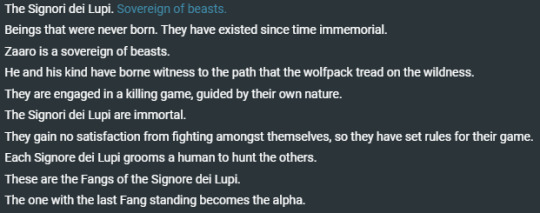
We see with other Fangs like Bernado, Lunacub and Crownslayer's mentor that they can function fine. Teach or lead others. And to an extent that the Signore dei Lupi treat them alright, with Agnese loving Lunacub and Zaaro working alongside Bernado.
Red's Signore dei Lupi is not like that.

Grandma put Red through hell to make her strong. Didn't teach her basic human skills that'd help her survive in society or without guidance.


And so she has educational and social problems and cuts anything that gets close on top of Kal'tsit needing to help her learn to think for herself.
Grandma destroyed her just to make her strong and judging by how Zaaro was able to turn the Bellone family into the strongest mafia family in Siracusa, the Signore dei Lupi are very knowledgeable in making something strong.
Grandma just chose to ignore everything else.
And actually there's a bit of phrasing that Red uses in Operational Intelligence's After-class Homework vignette to Ifritthat I find quite interesting:

Red is very simple, blunt and black and white in her thinking and a lot of her terminology is tied up in how the Signore dei Lupi's phrase things. Calling her weapons "Fangs" for example and the use of Hunt and Wolves.
And as the Signore dei Lupi's game is decided by the strongest, this phrasing by Red is really interesting. Like her identity is that she's a wolf hunter. Her life's goal is hunting every single one down. It makes sense that this would bleed into her vocabulary and beliefs.
And yeah. She's a tremendously strong character who was made that way at the cost of everything else and who is recognized by her strength and maybe judges others based on strength.
That's the analysis.
But another thing I want to briefly mention is how similar she is to Nearl oddly enough. Like, not just that they're two extremely skilled warriors or both engaged in a tournament where traditionally only one can win and will be the strongest.
But that that their ties within Rhodes are quite deep, with Nearl being an instructor and squad leader and Red being all the things I've mentioned up to this point. But also that they joined Rhodes, not being able to return to their home and that one day they would have to return to finish things.
These thoughts being what inspired this post and thinking of Red in a similar light to Nearl before her Alter is really quite interesting. But anyway, with Red in Siracusa right now I'm excited to see her character and strength on full display.
And I hope that this was in the very least an interesting read.
Edit: I forgot that I wanted to discuss Lappland's strength to sort of understand how strong "Outstanding" combat skill means cause a lot of the other's are really big.
Like Nearl being a two time champion of the Kazimierz major that accepts warriors from outside of Kazimierz. Who beat Mlynar in a sword fight (with him not using arts) and Mlynar beating a Silverlance Pegasus captain when only eight ordinary ones could withstand any assault the Armourless Union could throw at them.
And Hellagur having fought alongside Patriot and commenting on how if not for Patriot then he would've died against those very same Silverlance Pegasus forces in Operational Intelligence.
Or Ch'en and Qiubai standing their own against Ya, an Feranmut, and on two occasions standing against Ya on their own. And Hellagur having fought alongside Patriot
Comparatively what we see from Lappland is rather ordinary but at the same time holds a weight of it's own. Like Lappland's family the Saluzzo's is really the strongest family in Siracusa. Both in terms of producing the strongest people but also as a family.
When Il Siracusano starts the Bellones got boosted by Zaaro and the Rossati's got their position through inheriting the Texas family's wealth. The Saluzzo's got their through sheer power, a historied power going back to the She-Wolf's time as Signore Sicily states they are the oldest family.

And we know the first families come from the Tribes of the She-Wolf's children.
And Lappland, even for a Saluzzo is considered an invincible monster by even her Father who killed his chosen assassin like it was nothing and held off Wallach and Demetri at the same time. Except "fought" isn't the right word because he didn't consider them worth killing and did it enough to leave.
Wallach being strong but not Texas level in the least.
And who could forget that Lappland fought a Signore dei Lupi to a standstill and was offered by Signora Sicily to be one of her Bocca al Lupo's who would be Siracusa's elite guard and by that point had already been an Enforcer for her for quite some time.
One notable example being that Lappland casually dealt with Gambino and Capone by herself without breaking a sweat and while Il Siracusano says she is equals with Texas, at the same time Lappland did win and is ranked as having high combat skill.
Like it's an impressive record and odds are we've not seen her at her strongest either since a lot of who is fought in Il Siracusano aren't that strong especially compared to Texas and Lappland.
Never forget that Demetri backed down at the sheer sight of Lappland then I believe he later fought Wallach?
But also one extra thing about Lappland is this line:

Which is definitely more of that fear that Red induces in Lupos and we see is powerful enough to weaken Crownslayer and as stated before, even knock people out so I don't think that this is an accurate statement. Especially at launch.
But if it stays relevant to Il Siracusano that's odd cause Lappland is depicted as being incredibly smart and with a mighty death wish in the event. Easily deducing things and putting together traps and showing no restraint.
Like Il Siracusano Lappland I don't know if she'd say something like this without having assessed whether she would "definitely" die or not. But two different points in the game's lifespan.
The proper end!
#arknights#projekt red#I hope my points got across well#cause I do think that#red being practically an elite operator#while at rhodes#is really curious#and a lot of curious things get overlooked#without the knowledge that#she is so oddly skilled#also random but#mlynar too has an outstanding in combat skill#and mobility??#I'm not even going to think about that
25 notes
·
View notes
Text
University of Pennsylvania Must Stop All Its Sponsorship Of, and Stop the Use of Its Facilities and Its Logo, to Host The “Palestine Writes” Event, for the Following Reasons:
University of Pennsylvania (UPenn) receives federal funds, and is therefore required to provide a harassment-free learning environment for its Jewish students under Title VI of the 1964 Civil Rights Act. The “Palestine Writes” festival incites harassment and attacks on Jewish and pro-Israel students. Holding “Palestine Writes” is therefore a civil rights violation that may result in UPenn losing its federal funding.
The university cannot guarantee protection of Jewish students in an environment influenced by the unabashed antisemitic operatives speaking at this event, including:
a convicted Palestinian-Arab terrorist;
many speakers who support designated terrorist groups, including Hamas, Palestine Islamic Jihad, Hezbollah, Iran’s Islamic Revolutionary Guard Corps (IRGC), Turkish terror group IHH, the Fatah/PLO Al-Aqsa Martyrs’ Brigades;
many speakers who support and have assisted convicted terrorists;
many speakers who incite and call for Intifadas (terror wars against Jews, in which thousands of Jews have been murdered and maimed); and
notorious antisemites, such as Roger Waters, who uses Nazi imagery to malign Jews.
Removing this event from U. Penn would not inhibit free speech. “Free speech” does not require the university to host or support hate speech, or speech that it disagrees with. The university has the right to decide who to sponsor and who uses its facilities to speak.
UPenn has already set the precedent of punishing speech that it disagrees with, contradicting its claim that it is unable to exercise any authority over the “Palestine Writes” event. Another event also makes clear that Penn is selective about which “free speech” it protects. For example, UPenn has taken, or tried to take, actions against Professor Amy Wax, M.D., JD due to her controversial statements about Black law students’ achievement. The university took a class away from her, tried to sanction and fire her despite her tenure, and harassed her. We are not saying that we agree with Wax’s views but the University never defended Amy Wax’s controversial statements under their freedom of speech thesis. UPenn is therefore obligated to take action against the “Palestine Writes” hate-fest, or else must admit to endorsing antisemitism and accept the consequences, in accordance with U.S. law.
The university is failing to take responsibility for its own department(s) that are co-sponsoring “Palestine Writes.” UPenn gives funds to these departments, which in turn are co-sponsoring and providing resources to “Palestine Writes.”
Students for Justice in Palestine (SJP)’s UPenn and Temple U branches are co-sponsors of “Palestine Writes”, and many speakers are involved with SJP. As ZOA explained in its open letter to UPenn leaders: SJP activists systemically intimidate, harass and have even physically assaulted Jewish and pro-Israel students. SJP aggressively disrupts pro-Israel events – and screams for Israel’s destruction and “Intifada! Intifada!” (The murder of Jews). Hosting any event with SJP is antithetical to allowing free speech, and the university would be well within its rights to not allow the event. In fact, Fordham University successfully denied SJP official club status on its campus, and won the ensuing litigation for this very reason.
The New York State Appellate Division opined that Fordham University’s decision to deny official club status to SJP was appropriate because “the proposed [Fordham SJP] club, which would have been affiliated with a national organization [SJP] reported to have engaged in disruptive and coercive actions on other campuses, would work against, rather than enhance, respondent’s commitment to open dialogue and mutual learning and understanding. . .” (Awad, et al v. Fordham Univ., N.Y. App. Div. 1st Dept., Dec. 20, 2022.)
“Palestine Writes” is not actually about promoting arts. The content that is being celebrated and called “art” (films, children’s games, poems, etc.) consists of numerous speeches by Jew-haters, and is all being used for the purpose of promoting hatred against Israel and Jews, and annihilating Israel and replacing Israel with “Palestine.” (See details in ZOA’s open letter about the “Palestine Writes” program and speakers confirming this.) The Palestinian Authority pays terrorists to murder Jews; and Hamas’ charter calls for the murder of every Jew. These are the entities that “Palestine Writes” wants to replace Israel with.
Holding “Palestine Writes” at UPenn sets a dangerous precedent that will inspire more Jew-hatred and attacks on Jews around the country.
UPenn will have a dramatic drop in donations. Many donors are vowing to not give UPenn another penny ever, due to this hate-fest, and the value of this prestigious Ivy League university will plummet.
For more details, see ZOA’s open letter to UPenn leadership.
See ZOA’s Action Alert for the names and contact information of UPenn leaders to write to, to demand that they stop supporting and hosting this dangerous antisemitic Israel-bashing event.
In addition to any demanding that the university stop supporting and hosting “Palestine Writes” with the help of the talking points outlined above, please consider approaching additional sponsors of the “Palestine Writes” event, including:
The Sachs Program for Arts Innovation – Supporting and Promoting the Arts at the University of Pennsylvania;
Swarthmore College Peace and Conflict Studies;
The Wolf Humanities Center – Penn’s main hub for interdisciplinary humanities research and public programming;
Pennsylvania Council on the Arts (a Pennsylvania government entity); and
Australia Council on the Arts (an Australian government entity).
For more details, see ZOA’s open letter to UPenn leadership.
9 notes
·
View notes
Text
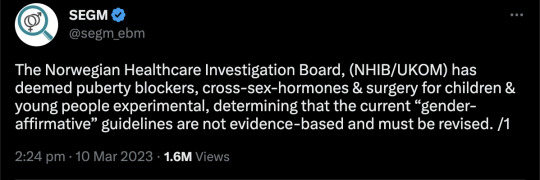
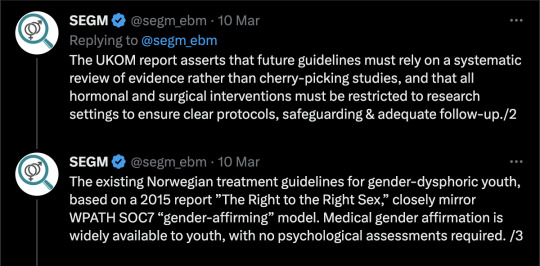

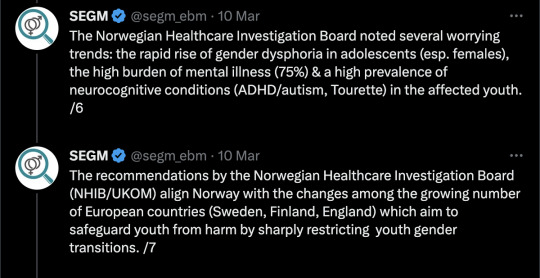
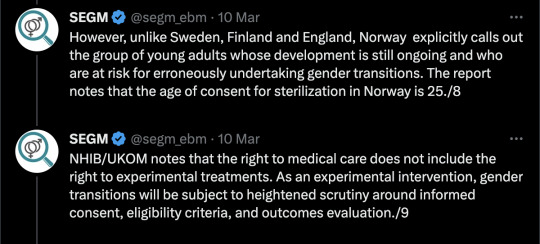
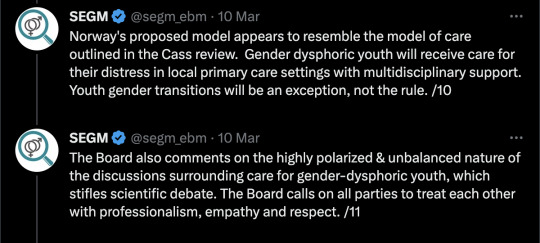
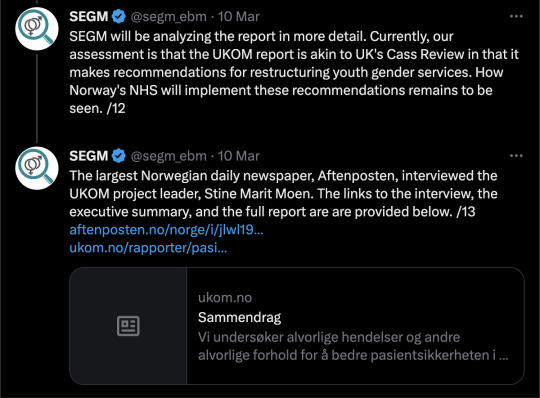
[ Autotranslated by Google ]
Patient safety for children and young people with gender incongruence
Published: Mar 9, 2023
People with gender incongruence and gender dysphoria have different wishes and needs for health services. Many people live well with their gender incongruence and manage it without health care, and others want and need health care. (See glossary in chapter 13 for word explanations)
When Ukom enters the topic of gender incongruence, we look at how patient safety is safeguarded in help and treatment services for gender incongruence and gender dysphoria. Our aim with the survey is to ensure safe help and treatment for children and young people with gender incongruence.
There is an ongoing public debate about treatment options for gender incongruity. This is demanding, and many refuse to participate in the debate. It can be challenging and difficult to participate because disagreements are large both between groups and within groups. We see that choice of words and understanding of the complexity is important. The situation of insecurity and disagreement affects the development of healthcare services.
In our report, we have tried to highlight different perspectives. At the same time, it is important for us to be clear about our findings. That is, what challenges patient safety. Many have worked and are working to confirm and build a good health service for people with gender incongruity and gender dysphoria, both nationally and internationally. Ukom's report builds on this work. We point out that this field now needs a boost to improve patient safety, especially for the health care that is to be provided to children and young people in Norway.
Summary
Ukom has carried out a survey of the treatment offered to children and young people with gender incongruence. The background was notifications directly to Ukom from relatives who question several matters related to patient safety. Several actors, both from the authority side, health personnel and patient and relative organisations, are questioning the soundness and organization of the treatment offer.
The report deals with children and young people in general. There has been a large increase in inquiries to the health service from people with gender incongruity in recent years. In particular, the number of children and young people in their teens who apply to, or are referred for assessment and treatment in the specialist health service, has increased significantly. The biggest increase is among adolescents and young adults who are registered as girls at birth, but identify as boys. Our attention has therefore been particularly directed at teenagers and young people with gender incongruence and gender dysphoria who seek health care. Children and young people are not fully developed physically, mentally, sexually or socially. This requires special vigilance with regard to patient safety. Our findings and recommendations will also be relevant for the offer for adults.
In the report, we have divided our findings into six main areas:
Insufficient knowledge
The knowledge base, especially research-based knowledge for gender-affirming treatment (hormonal and surgical), is insufficient and the long-term effects are little known. This is particularly true for the teenage population where the stability of their gender incongruence is also not known. There is a lack of research-based knowledge about the treatment of patients with non-binary gender incongruence. In order to safeguard patient safety, Ukom considers it necessary that the knowledge base on gender incongruence and gender dysphoria be strengthened, and that the health service offer be arranged in line with the knowledge base.
Overall management - a guideline with a different background
The Norwegian Directorate of Health's national professional guidelines for gender incongruity lay down guidelines for the health service offer. It concentrates on organisation, equality and rights. This may have been important at the time the guideline was drawn up, because it was necessary to confirm the health service offer to people who experience gender incongruity. At the same time, we consider that deviating from the requirement for the development of knowledge-based guidelines has created room for uncertainty and diverging expectations. Health personnel have been given great opportunities for interpretation within a relatively narrow subject area that lacks a systematic summary of knowledge in Norway. The guideline gives rights without clarifying questions related to prioritization and soundness. This is demanding for the health personnel who manage the services on a daily basis.
Requirements for soundness - particularly related to children and young people
The national professional guideline for gender incongruence is not normative. It does not set specific requirements for investigation or requirements for a medical indication for starting treatment. The mention of children's competence to consent and parents' right to information leaves room for interpretation. The guideline does not establish a sufficient standard for the health service offer, and we believe that for some patients it may pose a patient safety risk. This may go beyond the soundness requirement, which has broad roots in health legislation, and may also be demanding for the supervisory authorities.
Right to healthcare – a gap in expectations
Our investigation suggests that there is a gap between what the guideline outlines and what is possible, given today's available offer and knowledge base. The national professional guideline creates expectations in patients that the health service can only fulfill to a small extent. This applies, among other things, to the right to specialist healthcare services. It is difficult for the service to meet expectations without the knowledge base being well documented, and without a good overview of any negative and harmful aspects of the various treatments. If there is a requirement to use principles for experimental treatment, it will provide a framework that ensures information, thorough follow-up and contributes to more knowledge.
The help and treatment offer - variation in practice and expertise
There is great variation in what offers and what expertise is offered in different parts of the country. There is a risk of both under-, over- and incorrect treatment of children and young people with gender incongruence and gender dysphoria. In addition, we see that there are challenges in establishing a decentralized offer in a narrow and complex specialist field. In order to strengthen the offer, Ukom believes that it is important to strengthen the health service offer in the primary healthcare service, build increased interdisciplinary expertise in the specialist healthcare service at regional level and ensure that the national treatment service has sufficient capacity for today's demands.
Speech climate and interaction
We see that in the field of gender incongruence, a demanding climate of expression has developed. The speech climate in the public space affects the information available for children and young people with gender incongruence and gender dysphoria and their families. There is a significant impact on children and young people, also related to treatment and health services. We hear about fear and dread of making mistakes from all quarters. Different opinions about what is the right treatment can create a difficult cross-pressure. Different emphasis and mention of what is necessary at group level can confuse and destroy the patient-therapist relationship and a personalized approach for the person concerned. There is a need to establish a constructive community for everyone who is engaged in good health care for people with gender incongruity.
Ukom recommends
We are concerned that children and young people with gender incongruence have a safe and sound healthcare service. We therefore come up with recommendations that can contribute to this group receiving a better and safer health service offer in the long term. Our recommendations relate to revision of the guidelines, safe frameworks for treatment offered to children and young people and measures to strengthen the knowledge base. The recommendations will also contribute to the systematic collection of data and promote follow-up research. It is important that children and young people with gender incongruity and gender dysphoria, including non-binary ones, are properly looked after while the development of the healthcare service is ongoing.
Ukom recommends:
that the Ministry of Health and Care commissions the Directorate of Health to revise the national professional guideline, Gender congruence. The revision must, among other things, be based on a systematic summary of knowledge. We point to several elements that should be included in the audit.
that puberty delaying treatment (puberty blockers) and hormonal and surgical gender confirmation treatment for children and young people are defined as experimental treatment. This is particularly important for teenagers with gender dysphoria.
that the Ministry of Health and Care is considering whether a national medical quality register should be established for the treatment of children and young people with gender incongruity and gender dysphoria. Necessary measures must be implemented so that such a national quality register can be established, operated and financed in order to contribute to an overview, better quality and reduce unjustified variation in patient treatment.
--
Also, newspaper report:
[ Autotranslated by Google ]
Want safer treatment for children who want to change sex – Insufficient knowledge of the risk.
In recent decades, there has been a large increase in children and young people who want gender confirmation treatment - Insufficient knowledge of the risk, according to a report from the Commission of Inquiry.
A new report from Ukom now questions whether all children and young people who are unsure of their gender receive proper health care.
Ukom believes that clearer management and measures are necessary to ensure proper health care and treatment
[..]
From 1975 to 1990, there were approx. four referred persons per years for such treatment in Norway. In the last ten years, there has been an increase in referrals from approx. 50–70 per year in 2007–2010 to 400–600 referrals per year in 2018–2021.
[ More... ]
==
Norway has historically been held up as a "gold standard" for the faith-based ("gender affirming") model.
With a 150x increase in demand, that "gold standard" has now identified that there severe deficiencies - starting with lack of evidence - necessitating dismantling it. With a little luck and sanity, the holdouts, including the US and Canada, will find themselves pressured to undertake their own independent reviews.
The rickety house of cards just lost one of its support pillars.
#SEGM#Society for Evidence Based Gender Medicine#gender ideology#queer theory#medical transition#medical malpractice#medical scandal#gender affirming#affirmation model#affirmative therapy#affirmation#body mutilation#medical experimentation#medical experiment#experimental treatment#gender incongruence#gender dysphoria#puberty blockers#religion is a mental illness
12 notes
·
View notes
Text
The First 10 Amendments Of The Constitution Of The United States - Commonly Known As The Bill Of Rights - Ratified On December 15th, 1791:
Amendment I
Congress shall make no law respecting an establishment of religion, or prohibiting the free exercise thereof; or abridging the freedom of speech, or of the press; or the right of the people peaceably to assemble, and to petition the government for a redress of grievances.
Amendment II
A well regulated [regulate, rĕg′yə-lāt″, transitive verb, 1 - to control or direct according to rule, principle, or law, 2 - to adjust to a particular specification or requirement, 3 - to adjust (a mechanism) for accurate and proper functioning (The American Heritage® Dictionary of the English Language, 5th Edition)] militia [militia, mə-lĭsh′ə, noun, 1 - an army composed of ordinary citizens rather than professional soldiers, 2 - a military force that is not part of a regular army and is subject to call for service in an emergency, 3 - the whole body of physically fit CIVILIANS eligible by law for military service (The American Heritage® Dictionary of the English Language, 5th Edition)], being necessary to the security of a free state, the right of the people [people, pē′pəl, noun, 1 - humans considered as a group or in indefinite numbers, often treated as a plural of person, especially in compounds, 2 - the mass of ORDINARY persons; the POPULACE. Used with the, 3 - body of persons living in the same country under one national government; a nationality (The American Heritage® Dictionary of the English Language, 5th Edition)] to keep and bear arms, shall not be infringed [infringe, ĭn-frĭnj′, intransitive verb, 1 - to transgress or exceed the limits of; violate, 2 - to defeat; invalidate, 3 - to encroach on someone or something; engage in trespassing (The American Heritage® Dictionary of the English Language, 5th Edition)].
Amendment III
No soldier shall, in time of peace be quartered in any house, without the consent of the owner, nor in time of war, but in a manner to be prescribed by law.
Amendment IV
The right of the people to be secure in their persons, houses, papers, and effects, against unreasonable searches and seizures, shall not be violated, and no warrants shall issue, but upon probable cause, supported by oath or affirmation, and particularly describing the place to be searched, and the persons or things to be seized.
Amendment V
No person shall be held to answer for a capital, or otherwise infamous crime, unless on a presentment or indictment of a grand jury, except in cases arising in the land or naval forces, or in the militia, when in actual service in time of war or public danger; nor shall any person be subject for the same offense to be twice put in jeopardy of life or limb; nor shall be compelled in any criminal case to be a witness against himself, nor be deprived of life, liberty, or property, without due process of law; nor shall private property be taken for public use, without just compensation. [click on link to understand how this constitutional clause is knowingly violated on a daily basis, via the use of semantics (conducted in rem, or against the property itself, rather than in personam, or against the owner of the property), by the very government that is supposed to be protecting the God given right of the people stated in the afore mentioned clause)
Amendment VI
In all criminal prosecutions, the accused shall enjoy the right to a speedy and public trial, by an impartial jury of the state and district wherein the crime shall have been committed, which district shall have been previously ascertained by law, and to be informed of the nature and cause of the accusation; to be confronted with the witnesses against him; to have compulsory process for obtaining witnesses in his favor, and to have the assistance of counsel for his defense.
Amendment VII
In suits at common law, where the value in controversy shall exceed twenty dollars, the right of trial by jury shall be preserved, and no fact tried by a jury, shall be otherwise reexamined in any court of the United States, than according to the rules of the common law.
Amendment VIII
Excessive bail shall not be required, nor excessive fines imposed, nor cruel and unusual punishments inflicted.
Amendment IX
The enumeration in the Constitution, of certain rights, shall not be construed to deny or disparage others retained by the people.
Amendment X
The powers not delegated to the United States by the Constitution, nor prohibited by it to the states, are reserved to the states respectively, or to the people.
Unfortunately, this ship has sailed. Our founding & guiding document has been trampled upon and violated for many decades now. The time to stand and fight as a unified force has long since passed. Now, through brainwashing and the inducement of mass formation psychosis via the CIA Operation Mockingbird controlled media establishment, fluoride, geoengineering, GMO & processed foods and many other nefarious schemes & mechanisms, "The People" have, in the main, been reduced to overly compliant, chemically lobotomized, physically compromised shells of the images of God that they are. As I have illustrated above, a simple perusal of our Constitution with a dictionary in hand reveals the extent of its having been ignored and abused by the ones who were entrusted by "The People" to implement it. The last time (1861-65) a united group of "The People" attempted to stand against unconstitutional overreach it didn't end very well for them. In fact, the war that ensued only served to strengthen and embolden the Federal government in its trampling on the rights of the states and "The People". Also, in 1776 the "The People" and the state weren't too far apart in the weapons they could bring to bear against one another. Fast forward 200+ years and the pitiful few of the "The People", who would even dare defend the Constitution against its domestic enemies, will be wielding their AR-15s (that the Constitution violators vociferously try to take from them) against an enemy who wields predator drones, cruise missiles, A-10 attack aircraft and microwave weapons. 1861-65 will seem tame in comparison. Not to mention that the braindead masses will consider you the problem and not their government overlords.
I posted the above because I saw a Tumblr post with the Bill Of Rights listed along with a bunch of memes calling for people to take action. While I appreciate the sentiment, it isn't grounded in our current reality. Do what you need to do for you. Hard times are coming to America; deservedly so because we have forsaken our Maker who blessed us with America in the first place.
Repent, and believe the good news of Jesus the Messiah, for His kingdom is at hand!
#bill of rights#us constitution#constitutional#2nd amendment#2ndamendment#5th amendment#10th amendment#gospel of jesus christ#repent#faith in jesus#nwo new world order#agenda 21#agenda 2030#government corruption#government lies#government control
14 notes
·
View notes
Text
Bo jank Honseman: a frown in a sea of frowns? (and zukos here for some reason too??)
(yes prince thats rough buddy zuko, i too, question the monstrosity i have made)
I recently saw Bojack grouped in the category of frowns [sad shows] in a YT video thumbnail (dont remember the ytber, sorry to that man) in juxtaposition to Smiling Friends, a happy show [a rare smile].
And it may strike people as odd when I describe BJ H☆яɜmɑи as a not sad show. Bc... wtf do I mean by this?: Mainly that Bojack Horseman is a show colored by sadness not because of its contents, but its constituents. Bojack [the show] is tragic and angsty, but not inherently sad.
So for elucidation, the show is mainly comprised of opulence and indulgence, every other day bojack is snorting, sm☆kɩиɢ, transfusing or using a person, place or thing to bring himself enjoyment. The party is constantly raging, he is almost always surrounded by others and leeching off of them to occupy himself. The dopamine saturated and pleasure centered life Bojack has is idealized and not inherently bad. — What makes it bad however is Bojack's friction with the external, the incongruence of his tangible, external life with his quintessential internal need to be fulfilled. — If Bojack were a moderate, adjusted person who did not engage in things objectively malignant and extreme like: ɑʙusɜ and ɑddicτɩ☆и, the things around him would not be objectively bad, as seen with todd and mr peeber bobber, who, despite his flaws, is not drowned, subsumed and destroyed by the nature of his world the way Bojack is. Dwugs, parties and a little buttering the biscuit - the physicalities of life we indulge to varying degrees - are inherently fun, enjoyable things and can be and have been enhancements to people's lives.
As opposed to a character like Zuko [Avatar] who is not initially in conflict with his external [in relation to his internal] and thusly restricted by existential despair and a life he consequently renders angsty. His situation is not one of good soured by his own hand, there is no positive or enjoyable angle to his tragedy that requires a changing of the internal to transmute the nature of his interactions and experiences. His home life is ɑʙusιvɜ and vi☆lɜиτ, his family dynamics are broken, he is ostracized and subjugated and lives in fear and intimidation (it could be worse ofc but there is little good in his pains). He may be a prince but his autonomy is moot when contrasted by his age and the subsequent power his family status grants their household head. — This is reflective of Bojack, who may have social power and dominate aspects of his field, but is forced into undesirable positions by/for his aforementioned field. However, Bojack has no material threat necessitating his psychological and active compliance. He may be ideologically τ☆яtuяɜd as Zuko is by concepts of love, acceptance and honor, but Zuko wears the consequence of his non compliance in his flesh, his internal battle is one of conformity for/as to survive - internal failing conflated with and subsumed by the external. And while Bojack also has scars manifested in the physical such as his hospital visits and bɜɜя laden body, he is fighting a mostly psychological battle, with his tяɑu*mɑs spawning from his non tangible past — A[n immediate] fight he could win if he overcame his internal fixations, wants and whims and simply removed himself from an external situation he is not internally attuned to handle.
But bc he doesn't want to — internally attached to his toxic journey for the reliefs in its turbulence, for the promise of fulfilment he chases within it: things rendered vice by an unstable hand trying to chase a normative enjoyment only found in the normal/healthy enjoyment of things — his angst is born, his tragedy, unsatisfied by things he transmorgs, unsatisfied in the Bojack nature he engages, interacts and changes things. Ultimately, [unsatisfied] with himself.
This is where I note how and why tragedy is born: an intersection of sadness and angst. When the objective and subjective, the internal and external are synthesized to produce a melancholy, a battle one cannot win for its existential and intangible nature.
Tragedy is often associated with predetermination, destiny, and this is my similar rendering of it. Something that could've been avoided or evaded but befalls someone as a sort of inevitability. — When things not inherently sad or bad or malignant are made so as consequence, an immutable poison. This poison is what is tragic - for how it pollutes and ruins and destroys. Its the conflict, the friction, that internal and existential battle.
Which is why Zuko enters his angst phase when he leaves the fire nation. Physically he is freed, safe, and yet his mind torments him - the conflict and friction borne of his incongruence and dissatisfaction with his external, despite how objectively enjoyable it is. This reaches its climax in Book 2, when he has fully relinquished his emotional and social [aka internal/psychological] tether to the fire nation and is thusly relinquished from physical harm and threat — yet can thusly only maintain an internal tether with this pain he has rendered a manifestation of beauty. — He has a loving and caring uncle, a peaceful home, a homely and contributory tea shop which gives him purpose and an almost leisurely life.
Yet when Jin kisses him, when he is confronted with love, unabashed and abounding, his mind poisons it. He has too much internal baggage, he is not able to process things as they purely exist. "It's complicated. I have to go." And ofc it is, Zuko has complicated it through the nuances and conflict of his person. Therefore, he has to leave, reject something he admits is nice, decouple with the tangible, external prospects and reality of his existence for one overcome by angst, existentialism and ideology.
To the tragic antihero - who rejects the good, it is as much their solace as it is their 4377. Solace in the irrelevant tangible, and torment in the all encompassing internal [that drowns and renders all malignant].
So for characters who mess up and hurt others bc of who they are, and not what is currently around them, their lives may not be tangibly sad or tragic or bad, but they, as manifestations of these things, translate them that way. All that enters them is as they are.
Bojack heehaw is sad, but Bojack Honsie the show is one where often, thee malcontent[s] (inculding/especially Bojack) poison and distrub what is around them with their existential angst [AND STRUGGLE FOR EXISTENCE!].
Bojack doesn't have to pursure Penny, he doesn't need to choose fame over a quaint life, Todd doesn't have to reconcile with Bojack, people don't have to watch passively as he [Bojack] squeezes the life from Gia, Princess Carolyn doesn't have to pursue a natural born child, Bojack doesn't have to do a second interview, Ralph doesn't need to be inconsiderate of his family's affect on Carolyn, Bojack doesn't have to call up Sarah Lynn etc, but he does, and they do because that's who they are, and existence is lived in pursuit of the pʟɜɑsuяaʙʟɜ. An empty internal affair that when confornted with the starkness of reality, turns away and rejects, switches off and reverts to the internal, the self[centring]. - Human nature pervades all. The whims and wants of our angst dictate our prioritization, behavior and ultimately, what we try fill our holes with - frivolities, ignorance, ease.
Bojack's world is one of smiles, of ecstasy and indulgence and mindlessness, but there seems to exist an implicit knowledge of the unfulfilling and empty shadow of extravagance. The compensation and the clinical, impersonal nature of it all that we recognize in Bojack's attempts to turn the niceties up to 100. The toxicity in extreme positivity, and how trying to supplement and neglect the substantial weights of your past, reality of your present and the turmoil of your interior slowly collapses the stability of your perception and person.
— The quote on quote pʟɜɑsuяɜs are tragic bc of what a perversion they are, how smth that should be joyous and enriching has been twisted. And the almost good souls that have been trapped in their eternal twisting.
Zuko thought being embraced by that which was elevated and extraordinary would fulfil him, as did Bojack.
However as we do, they knew deep down that the sensory, visceral physicalities and enjoyments of life, meant to entertain and serve as nebulous performance that flaunts the ideal and something to covet after, are no substitute, and exist as vacant methods to occupy and distract us with the palatable and easy.
It is easy to look away and nurse your hubris and stew over what's inside instead of actively exerting your agency and responsibility/accountability in doing what is hard and challenging. —What grounds you to reality and is neither extreme pain or plɜɑsuяɜ, but the virtue in living purely, acting and reacting, accepting things as they exist. - Tending to your true existential need [by abandoning the insubstantial and embracing the tangible good].
— As Bojacko demonstrates [conversely], when left to the devices of our internal: strife ensues.
In a manner very dialectical, our experiences are made up of internal manifestations of personhood - what we expect and what we know and how we transmute things - end up being all we're left with.
Todd Chavez, "BoJack, stop. You are all the things that are wrong with you! It's not the alcohol, or the drugs, or any of the shitty things that happened in your career, or when you were a kid! It's you! Alright? It's you. Fuck, man. What else is there to say?"
we are our own ʜɜʟʟ
not 2 fuggin mention how Zuko's half face symbolism and how his father['s side also] represented the vacuous, indulgent aristocracy while his roku side represented internal, moral values, significant emotional relationships/ties and grassroots rebellion but im big tired & thats kind of a different topic so maybe next time?
#anyway i think thats it leave me alone im tired#bojack spoilers#bojack analysis#atla#honestly bjhm tag is its own tw#violence tw#drug ment tw#smoking tw#abuse mention#addiction mention#anti ozai#bojack horseman meta#zuko avatar#who are you and what do you want?#zuko avatar the last airbender#bjhm#atla meta#atla analysis#jinko#eat the rich#existential thoughts#bojack horseman season 4#bojack horseman season 6#bojack and zuko kind of parallels with similar vices; wants and struggles??? 😱#bojack horseman s5#zuko meta
5 notes
·
View notes
Text
When I saw these articles I though one was an update. Nope. Two different trans perverts in the UK in one week.
A trans-identified male who describes himself as a “sexual deviant” stands accused of child sexual abuse and of disseminating child sexual exploitation material. Jonathan Lea, 44, who also uses the name Emma Bella-Puttana, was arrested following a filmed pedophile sting by an anti-predator group and is currently in police custody.
A collective of volunteers affiliated with the Online Child Abuse Activist Group (OCAAG) confronted Lea on August 18. The grassroots organization End Game streamed the video of the interaction with Lea to their Facebook page, where it currently has nearly 40,000 views. During the confrontation, Lea confirmed his identity and names, both his male name and his “transgender” name.
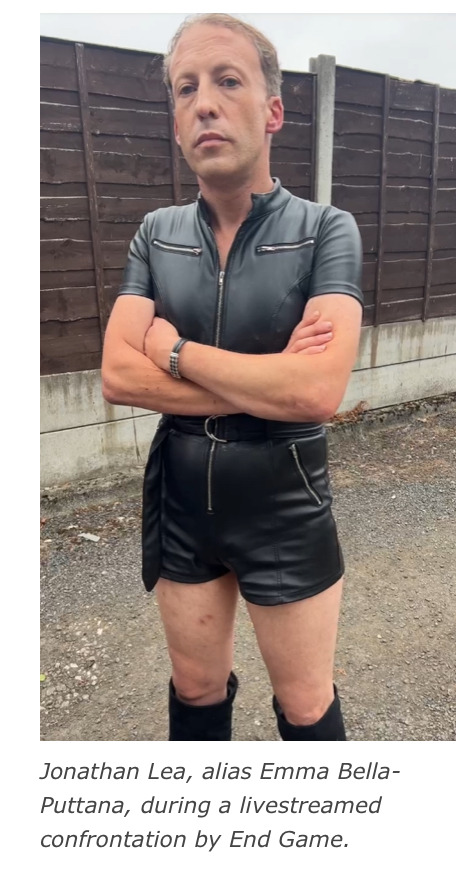
See rest of article
A UK-based transgender TikToker has been revealed as a violent criminal who was sentenced to 9 years in prison after being convicted of a vicious rape attempt on a vulnerable woman.
Jason Croker, of Oldbury Close, Redditch, was required to register as a sex offender for life after what was described as a “wicked” attempt to sexually abuse a woman.
In February of 2015, a Warwick County Court heard how Jason Croker, then 38, brutally attacked a woman in the back of his van in May of 2013 before strangling her and leaving her unconscious in a remote area. Croker had known the woman for several years as a friend.
Croker had lured her on the premise of being in need of help with moving his belongings. Instead, he drove her to a secluded field in the countryside and demanded sex from her using graphic language. When she refused, he physically attacked her.
During the hearing, Prosecutor Harpreet Sandu noted that her resistance “unfortunately did not prevent Mr. Croker from trying to get what he wanted and trying to take advantage of his friend whose generosity he had preyed upon … He got back into the driver’s side. She was effectively trapped. He tried to force her clothes off. He pinned her down and undid his trousers while continuing to hold her down.”
Croker also threatened the woman with rape if she didn’t comply, but the victim continued to struggle, hitting Croker in the head in an attempt to get away. Prosecutor Sandu noted that her efforts were in vain, and Croker eventually overpowered her and began to grope her sexually.
Croker then choked the victim, causing her to lose consciousness. He dumped her in the field and fled. Upon regaining consciousness, the woman managed to hobble to a nearby street and flag down a car for help. The woman was admitted to a local hospital “with injuries consistent with what she said had happened,” according to Prosecutor Sandu.
#UK#two pervs same week#Online Child Abuse Activist Group (OCAAG)#End Game#Emma Bell-Puttana is really Jonathan Lea#Jason Crocker#Male violence#Dresses don’t make men less violent
2 notes
·
View notes
Text
Tracet's Guide to Action-Based Forms and Configurable Audits for Fixed Asset Management

Key Features of Tracet Fixed Asset Management:
1. Action-Based Forms:
Tracet Fixed Asset Management action-based forms enable users to streamline data collection and entry processes by presenting dynamic forms with fields and options based on predefined actions or conditions. For example, when adding a new asset to the system, the form may prompt users to select the asset type, location, and depreciation method, with relevant fields displayed based on the selected options. This ensures consistency and accuracy in data capture while reducing manual errors and speeding up the asset onboarding process.
2. Asset Listing View:
Tracet Fixed Asset Management asset listing view provides users with a comprehensive overview of all fixed assets within the organization, including details such as asset name, description, location, acquisition date, depreciation status, and current value. Users can easily search, filter, and sort assets based on various criteria to quickly locate specific assets or generate customized reports. Additionally, the listing view may support customizable views and layouts, allowing users to tailor the display to their preferences and requirements.
3. Calculation Fields:
Calculation fields enable users to perform complex calculations and generate real-time insights based on asset data. For example, users can calculate depreciation expenses, asset lifecycles, maintenance costs, and return on investment (ROI) using predefined formulas or custom expressions. This empowers organizations to make informed decisions regarding asset utilization, maintenance scheduling, and capital budgeting, leading to improved resource allocation and cost optimization.
4. Client-Defined Workflow Actions:
Client-defined workflow actions allow organizations to define and automate asset management workflows based on their unique business processes and requirements. This includes defining approval workflows for asset acquisitions, disposals, and transfers, as well as triggering notifications and alerts for pending actions or overdue tasks. By automating routine tasks and standardizing workflows, organizations can improve process efficiency, reduce administrative overhead, and ensure compliance with internal policies and external regulations.
5. Configurable Audits:
Configurable audits enable organizations to conduct regular audits of fixed assets to verify accuracy, compliance, and adherence to internal controls. Audits can be configured based on predefined criteria, such as asset category, location, or depreciation method, and scheduled at regular intervals or triggered manually as needed. Auditors can perform physical inspections, reconcile asset records with financial statements, and identify discrepancies or anomalies requiring further investigation. Additionally, audit trails and documentation ensure transparency and accountability throughout the audit process, facilitating regulatory compliance and risk management.
6. Custom Fields:
Tracet Fixed Asset Management custom fields allow organizations to capture additional information and attributes specific to their unique asset management requirements. This includes user-defined fields for tracking warranty information, service history, serial numbers, and custom classifications or categorizations. By tailoring the data capture process to their specific needs, organizations can enhance the relevance and granularity of asset information, enabling more accurate reporting and analysis.
7. Custom Groups:
Tracet Fixed Asset Management custom groups enable organizations to categorize and group fixed assets based on shared characteristics or attributes. This includes creating custom groups for assets located in specific departments, divisions, or cost centers, as well as grouping assets by function, usage, or condition. Custom groups facilitate better organization and management of assets, allowing users to view and analyze asset data within the context of their respective groups. This enhances visibility and control over asset portfolios, enabling more informed decision-making and resource allocation.
8. Custom Reports:
Tracet Fixed Asset Management custom reports enable organizations to generate tailored reports and dashboards to analyze asset performance, utilization, and financial metrics. Users can create custom report templates with predefined layouts, filters, and parameters to extract relevant insights from asset data. This includes generating depreciation schedules, asset valuations, maintenance histories, and cost-benefit analyses for strategic decision-making and financial planning. Custom reports can be scheduled for automated generation and distribution to key stakeholders, ensuring timely access to critical information for informed decision-making.
9. Field Requirements:
Tracet Fixed Asset Management field requirements enforce data validation rules and integrity constraints to ensure the accuracy and completeness of asset information. This includes defining mandatory fields, data formats, and validation criteria for specific fields to prevent data entry errors and inconsistencies. Field requirements help maintain data quality and reliability throughout the asset lifecycle, reducing the risk of inaccuracies and discrepancies in reporting and analysis. Additionally, field requirements can improve user productivity by guiding users through the data entry process and providing real-time feedback on data quality.
10. Notifications:
Notifications provide real-time alerts and reminders to users regarding pending actions, deadlines, or critical events related to fixed asset management. This includes notifying users of upcoming maintenance tasks, pending approvals, or changes to asset status or ownership. Notifications can be delivered via email, SMS, or in-app notifications, ensuring timely communication and response to important events. By keeping users informed and engaged, notifications enhance accountability and compliance with asset management processes and policies.
Tracking fixed assets with Tracet Fixed Asset Management is vital for smooth operations, cost control, and rule compliance. Tracet’s features, like interactive forms, customizable audits, and reports, simplify asset management, maintenance, and reporting. This boosts visibility, control, and decision-making. Using Tracet ensures organizations maximize asset value, aiding growth, and profitability in today’s business landscape. Contact us for more details.
#eliminatemanualwork#productivityboost#efficiency#assettracking#softwaresolution#streamlineprocesses#digitaltransformation#assetmanagement#automation#technologyadvancement
0 notes
Text
How Columbia’s Campus Was Torn Apart Over Gaza, Forever Palestine 🇵🇸
The University Asked the N.Y.P.D. to Arrest Pro-Palestine Student Protesters. Was it a Necessary Step to Protect Jewish Students (The Zionist 🐗🐖🐷 🐖), or a Dangerous Encroachment on Academic Freedom?
— By Andrew Marantz | April 25, 2024
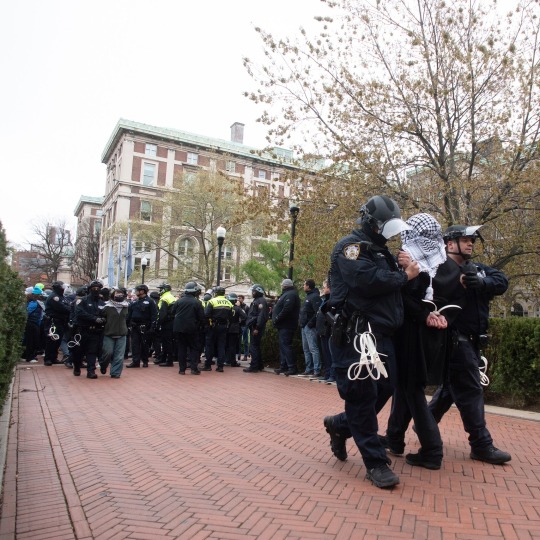
Photograph by C.S. Muncy/NYT/Redux
In the Predawn Hours of Wednesday, April 17th, more than a hundred student activists walked onto a lawn in front of the Butler Library, in the middle of Columbia University’s campus. The center of campus is usually open to city foot traffic, but, because of recent tensions, campus administrators had restricted access to Columbia I.D. holders; many of the activists, trying to stay anonymous, were careful not to swipe their I.D.s on the way in. They set up a few dozen green tents, a couple of Palestinian flags, and some handwritten signs (“columbia funds genocide”; “while you read, gaza bleeds”). One of the signs in the encampment read “liberated zone,” a reference to a wave of protests at Columbia in the late sixties. “We’re calling it an occupation,” Maryam Iqbal, a first-year Barnard College student wearing hoop earrings, told me. “We’ve been building up to this action for months.”
Since October 7th, Columbia, like many universities, has been roiled by protests and counter-protests. (“It’s basically the only thing anyone here can talk about,” one student told me.) Iqbal, an eighteen-year-old from Seattle, is a leader of the Columbia chapter of Students for Justice in Palestine, an organization that was suspended in November, after administrators alleged that the group had “repeatedly violated University policies.” Next to the lawn, about a hundred more protesters marched in support of the encampment, though here the message discipline was more lax (“we will not be silent,” but also “globalize the intifada”). Eventually, some counter-protesters showed up, chanting “Am Yisrael chai” (“The people of Israel live”) and waving a huge Israeli flag.
In the past six months, several students have reported being physically assaulted on or near Columbia’s campus. Some of these students were apparently targeted for being visibly Jewish or pro-Israel, others for being visibly Muslim or pro-Palestine, and some for being Jewish but critical of Israel (including some who were called “self-hating Jews”). “Any time there is violence in the region where Israelis and Palestinians kill each other, there is an increase in antisemitic and anti-Muslim incidents in the U.S. and Europe,” Yinon Cohen, a professor of Israel and Jewish studies at Columbia, told me in November. The majority of the controversy at Columbia, though, has concerned not violence but speech: radical slogans, hastily planned protests, even contentious discussions in classrooms. This included squarely political speech (“Free Palestine,” say, or “Israel is an apartheid state”) of the sort that many members of the Columbia community might disagree with, but which few would be inclined to punish. (“Some of these reported antisemitic incidents are not really antisemitic but rather anti-Israel or anti-Zionist,” Cohen added.) And, even when the speech was abhorrent, or plainly antisemitic, it was still generally protected by the First Amendment. Still, for Columbia’s administration, the First Amendment was not the only guiding principle; the university also has an institutional duty, and indeed a legal obligation, to foster a safe environment for its students. According to Title VI of the Civil Rights Act, entities that receive federal funds are required to prevent discrimination on the basis of race or national origin. “Columbia is mandated by federal law to ensure equal access to all University services for Jews and Israelis, including those who identify as Zionists,” a group calling itself Columbia Faculty and Staff Supporting Israel wrote in an open letter.
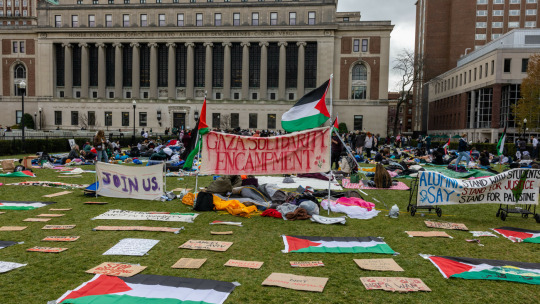
Maytal Polonetsky, a Barnard first-year and a modern Orthodox Jew, told me, “I have a necklace with a pendant in the shape of Israel, and in class I’ll often tuck it in, because I don’t want to deal with the blowback.” Polonetsky grew up in Potomac, Maryland, and spent a year studying at a religious school in Jerusalem before college. She said that she thought of the necklace as both a political symbol and religious one. Obviously, it would be unacceptable to ostracize anyone simply because of her Jewish identity; being criticized for one’s political ideology, however, might be painful but not beyond the pale. “For the past month, my mom has been seeing stuff on the news about Columbia and telling me, ‘Come home, you’re not safe there,’ ” Polonetsky said. “I told her, ‘Mom, it’s emotionally wrenching, it’s exhausting, but I’m not in physical danger.’ ”
Columbia’s administrators seemed at pains to show that they had things under control. They set up a Doxing Resource Group, after the identities of many student activists were revealed by outside agitators, and a Task Force on Antisemitism, to insure that Columbia would be “safe, welcoming, and inclusive for Jewish students.” (Many people noted, with indignation, that there was no Task Force on Islamophobia.) Still, the more the administration intervened, the worse things seemed to get. In February, a Jewish student sued Columbia under Title VI, claiming that its failure to “prohibit discrimination and retaliation against Jewish persons” had rendered the university a “hostile environment.” Later that month, in a separate lawsuit, fifteen more students filed a hundred-page complaint, which detailed several allegations of antisemitism on campus; it also argued that “anti-Zionism is not merely a political movement—although many try to disguise it as such—but is a direct attack against Israel as a Jewish collectivity.” While these students maintained that the university had not done enough to crack down on demonstrations, another lawsuit, filed by the New York Civil Liberties Union and the advocacy group Palestine Legal, argued that the university had already gone too far, violating the demonstrators’ legal rights in the process. “The tactic of our administration, and of other people in power, has been to conflate critique of Israel with anti-Jewish hate,” Debbie Becher, a sociology professor at Barnard, told me. “It’s not a novel tactic, but it’s been very effective and very damaging.” Becher is Jewish, as are the members of Jewish Voice for Peace, another student group that was suspended from Columbia in November after protesting the war. On Wednesday, a couple of the activists on the lawn wore yarmulkes, as did many of the counter-protesters. “ ‘To protect the feelings of some of our Jewish students, we’re going to ban the political speech of our other Jewish students,’ ” Ilan Cohen, an undergraduate pursuing a dual degree at Columbia and the Jewish Theological Seminary told me, paraphrasing what he saw as the university’s position. “Make it make sense.”

Photograph by Mark Peterson/Redux
Another student at Barnard and the Jewish Theological Seminary was more muted in her critique. “Is there antisemitism at Columbia? Of course,” she told me. “We’re in New York City. Even before this protest, we had a self-declared neo-Nazi standing outside the campus gates and shouting things. Now, it’s only gotten worse.” She has found it hard to discuss this honestly with her progressive friends, she continued, “because of how antisemitism is exploited. The conservative pro-Israel position is ‘Columbia is this horrible den of antisemitism. People are only protesting Israel because they hate the Jews’—which is wrong, so then the pro-Palestine students’ instinct is to deny that there’s antisemitism within the movement at all.” She maintained that the antiwar protests were not primarily motivated by antisemitism. “Those people, they’re in no way a majority—often they’re not even Columbia students,” she said. “But, still, it’s the movement’s job to acknowledge it, and root it out.” Jameel Jaffer, the executive director of the Knight First Amendment Institute at Columbia University, wrote that he was “deeply troubled” by “the University’s severe and seemingly viewpoint-discriminatory enforcement of rules relating to student demonstrations.” Although the university obviously had “a responsibility to take action against genuine threats and harassment,” he continued, it also had an obligation to encourage “free inquiry and the production of knowledge.”
At the Center of the Encampment, shortly after 10 a.m., Mahmood Mamdani, an anthropologist at Columbia, spoke about the protests against segregation in the American South and apartheid in South Africa, and added, “This is the next great international-solidarity movement.” A police helicopter hovered overhead. “I won’t talk too loud. I don’t want the police to hear,” he added—a joke, or maybe a half-joke. The rumor passing through the crowd was that anyone who did not leave the lawn by 11 a.m. would be risking suspension, and possibly arrest. In April, 1968, when hundreds of students were occupying several buildings on campus, the university’s president, Grayson Kirk, asked the N.Y.P.D. to remove them. Police officers in riot gear stormed in, arresting more than seven hundred students and beating many of them in the process. (The Times later referred to Kirk’s “ill-fated decision” as “an emblem of the generational conflict characterizing the Vietnam War era,” and it ultimately cost Kirk his job.) Since then, the N.Y.P.D. has been invited onto the campus only in rare circumstances, and never without controversy. A professor standing near the lawn told me, “If they think they can calm down this situation by arresting students, that will absolutely have the opposite effect.”

The demonstration had been timed to coincide with events in Washington, D.C. The current president of Columbia, Minouche Shafik, was about to testify in Congress, before the same committee that had grilled the presidents of Harvard, M.I.T., and the University of Pennsylvania four months earlier. Representative Elise Stefanik—a Harvard alum, and a former Bush Administration moderate turned pugnacious Trump loyalist—implied that the college presidents had allowed students to call for the “genocide of Jews.” Her framing was disingenuous, but she was rewarded with glowing coverage in the conservative press and mentioned as a potential running mate for Donald Trump. Four days after the hearing, Liz Magill, the president of Penn, resigned. “One down. Two to go,” Stefanik tweeted. Claudine Gay, the president of Harvard, also resigned a month later.
Now it was Shafik’s time in the barrel. The title of her hearing—“Columbia in Crisis: Columbia University’s Response to Antisemitism”—seemed to assume that the sole cause of campus turmoil was antisemitism, and that a more robust “response” might be needed. Going into the hearing, Shafik seemed determined to demonstrate to Congress that she was not afraid to take the situation in hand, with force if necessary. “This isn’t like the anti-apartheid protests we had here in the eighties, and this isn’t like 1968, either,” someone familiar with the thinking of Columbia’s administration told me. “These protests are pitting groups of students, and some faculty, against each other. They can turn vicious, hateful at times, and quickly become about personal identity.” Shortly after Shafik announced that she would testify, Becher and two dozen other Jewish professors at Barnard and Columbia drafted an open letter to Shafik, acknowledging that antisemitism “exists everywhere, including at Columbia,” but objecting to “the ways charges of antisemitism are being weaponized.” Becher and her colleagues mentioned McCarthy-era “Red-baiting” and recent book bans in Texas and Florida, and urged Shafik to respond “with an affirmation of our values”—academic freedom, for instance—“that refuses to concede the premise of these traps.” (I, too, signed an open letter last year, calling for “a diplomatic path towards peace.”) Some students had sympathy for Shafik, who was both the first woman and the first person of color to serve as Columbia’s president, and who seemed to be in a nearly impossible position. “I don’t see things getting better if she gets fired,” one told me. Others were unmoved. “She’s our ‘first African president,’ ” a student of Black and Arab ancestry told me, with an eye roll. “But, trust me, we do not claim her.”

In Columbia’s student center, in a lounge called the Audre Lorde Community Space, the leaders of a few student-activist groups were hosting an impromptu hearing watch party. A projector and a Bluetooth speaker had been set up between the Community Conference Room (a sign outside the room read “What does community mean to you?”) and the Liberation Conference Room (“Without community, there is no liberation”). One of Columbia’s trustees, Claire Shipman, was on the screen, testifying in a tone of steely resolve: “We’ve suspended two student groups for noncompliance—more than a dozen individual students—and we disciplined faculty members,” she said. “We are far from done.”
Members of the committee questioned Shafik in tones that ranged from lightly veiled intimidation to theocratic farce. Rick Allen, a Republican congressman from Georgia, shared his opinion that “Washington, D.C., is not the center of the universe—Jerusalem is the center of the universe,” and suggested that Columbia should offer “a course on the Bible.”
“The Bible is in our core curriculum!” a student at the watch party cried. “Did this man even Google us?”
Allen loosely quoted Genesis 12:3—“ ‘If you curse Israel, I will curse you’ ”—and asked Shafik, “Do you want Columbia University to be cursed by God?” (Shafik clarified that she did not.) “ ‘Columbia: Cursed by God,’ ” a student in the lounge said. “Somebody has to put that on a T-shirt.” When it was Stefanik’s turn, the room grew quiet. In the back of the room, a student knitting a scarf nervously picked up the pace of her stitches. Stefanik brought up, by name, several professors who had made controversial statements since October 7th, asking what disciplinary actions had been taken against them. “She is really out for blood,” Becher, the Barnard professor, said.
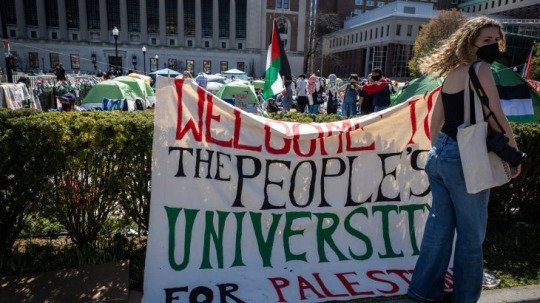
Shafik could have condemned some of the speech she’d heard on campus while asserting the rights of students and scholars to free expression. Instead, when lawmakers urged her to discipline her students and faculty, she sometimes seemed almost eager to comply. If one of the goals of the hearing was to strike fear into the hearts of student activists, then, judging from the silence in the Community Space, it seemed to be working. And yet some observers, especially on the right, still insisted that Shafik had not done enough to prove her commitment to protecting Jewish students. “Watch Columbia President Shafik squirm, hem & haw,” Jason Greenblatt, Donald Trump’s former envoy to the Middle East, tweeted. “Wake up America.”
Before Shafik’s testimony was over, campus-security officers handed out flyers to the students in the encampment, warning them to “stop your disruption now.” The next day, Shafik sent an e-mail to the “University community.” “Out of an abundance of concern for the safety of Columbia’s campus, I authorized the New York Police Department to begin clearing the encampment from the South Lawn,” she wrote. “ ‘Clear and present danger’ is the language used by Columbia University in their letter to us,” John Chell, a bureau chief at the N.Y.P.D., said, at a press conference.
Police officers moved in, wearing riot helmets and carrying plastic zip ties. The campus was packed with hundreds of people who supported the encampment, forming a picket line on all sides of the lawn; when the police broke through, the supporters erupted in chants and jeers. According to the National Lawyers Guild, the officers arrested two legal observers; they also arrested more than a hundred students, cuffing their wrists and loading them onto white Department of Correction buses. “We walked past the entire school, everyone we knew, chanting ‘Disclose, divest, we will not stop, we will not rest,’ ” Iqbal, the Barnard student from Seattle, told me. “Almost all of us made the decision not to resist.” (“The students that were arrested were peaceful, offered no resistance whatsoever, just saying what they wanted to say in a peaceful manner,” Chell has said.) Once the protesters had been removed, the police broke down some of the tents and banners and tossed them into an alley. Among the scattered belongings that were left behind on the lawn were a few rumpled Palestinian flags, some sleeping bags, and a copy of “Culture and Imperialism” by Edward Said.

In 1966, Ronald Reagan, a former actor running for governor of California, gave a campaign speech about what he called the “morality and decency gap at the University of California at Berkeley,” which he blamed on “a small minority of beatniks, radicals, and filthy speech advocates.” In his opinion, these “so-called ‘free-speech advocates’ . . . should have been taken by the scruff of the neck and thrown off of the campus permanently.” Richard Nixon sounded a similar note two years later, during his Presidential campaign. None of this rhetoric did much to pacify the campuses in question, and it certainly did nothing to address the root causes of the unrest, such as Jim Crow and the Vietnam War. It did, however, help both candidates win their respective elections.
Although Columbia is a private university, it is not immune to government pressure. Its Manhattan real-estate holdings are exempt from more than a hundred million dollars in property taxes, an exemption that could be reversed by state legislation. It receives federal grant money, which could also be rescinded. (On April 23rd, Stefanik wrote a letter to the Secretary of Education, demanding that he “revoke any federal funding flowing to Columbia and similar institutions.” The following day, Mike Johnson, the Speaker of the House, gave a speech at Columbia, while onlookers heckled him. “We respect diversity of ideas,” he said, “but there is a way to do that in a lawful manner and that’s not what this is.”) The ostensible purpose of the congressional hearing had been to protect Jewish students, but some on campus argued that the lawmakers’ true motive was to exert control and ideological influence. “I think they want to frame élite universities as engines of woke indoctrination, and this gives them a perfect pretext,” Becher said, of “maga Republicans” in Congress. “And meanwhile they hope they can strong-arm administrators into doing their bidding, like hiring more conservatives or firing professors who seem too far left.”

Every politician, college president, and public intellectual claims to be in favor of free speech, a stance that is about as brave as being in favor of puppies and ice cream. The more difficult question, not just for politicians but for all of us, is not whether freedom of speech is an essential value but what to do when it comes into tension with other essential values, such as, in this case, Columbia’s mandate to insure that it does not create a hostile environment for Jewish students, Muslim students, or anyone else on campus. For the past few years, the prevailing narrative, culturally dominant even when not entirely justified by the facts, has been that conservatives are champions of free speech and progressives are delicate snowflakes who can’t handle challenging ideas. Now, suddenly, the left was sticking up for unfettered expression, and Republican legislators were the ones asking Columbia to provide a safe space. In the opinion of some Jews (including, full disclosure, the one writing this piece), Judaism and Zionism are closely related, but they’re not the same, something that has seemed to be a source of confusion not only at Columbia but around the world. Title VI protects Jewish students from discrimination on the basis of being Jewish, but it does not shield anyone from experiencing discomfort over political disagreements. In other words, it seems to me that antisemitism is against the rules, but criticism of Israel’s actions is not, or at least it shouldn’t be.
After the encampments were cleared, much of the protest activity was pushed off campus, and the mood became even more volatile. On Saturday night, Polonetsky, the Orthodox Jewish student from Maryland, was walking across campus, on her way home from Shabbos services. She told me, “Some Jewish kids I knew were standing on the Sundial”—a raised platform in the middle of campus—waving Israeli and American flags. She stood off to the side, waiting to see what would happen. The students sang “One Day,” by the vociferously pro-Israel singer Matisyahu. (“There’ll be no more wars / And our children will play / One day.”) They were surrounded by protesters, but, for a while, things were relatively calm. Then one of the Jewish students dropped an Israeli flag, and one of the protesters ran over and tried to grab it. A lot of people seemed eager for a confrontation. Another protester—blond hair, face obscured by a kaffiyeh—stood next to the Sundial holding up a handwritten cardboard sign that said “Al-Qasam’s Next Targets,” with an arrow pointing up at the Jewish students. (Al-Qassam Brigades are the military wing of Hamas.) Polonetsky and a few friends decided to leave campus in a group, so that none of them would have to walk home alone. When they got to the only gate that was open, on Amsterdam, protesters heckled them, shouting “Yehudim! Fuck you!” and “Stop killing children!” and “Go back to Poland!” Most of these antisemitic hecklers seemed to be unaffiliated opportunists, not Columbia students, but in the chaos no one could tell for sure. Polonetsky got back to her dorm safely, but she found it hard to sleep. “The next morning, I called my mom, and said, ‘You’re right, I’m not sure I’m safe here,’ ” she told me. She had not been planning to leave campus until the following day, for Passover, but instead she booked a ticket on the next train home.
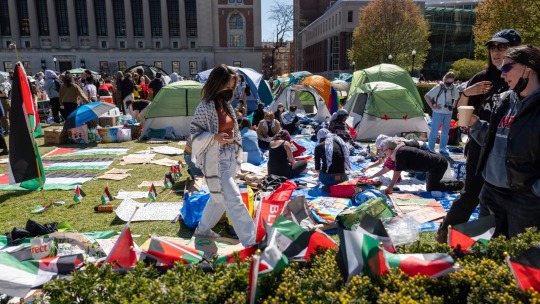
When I asked a university spokesperson to comment on the mass arrests, she pointed me to the letter that Shafik had sent to the N.Y.P.D., requesting its presence on campus. The letter read, in part, “Columbia is committed to allowing members of our community to engage in political expression—within established rules and with respect for the safety of all.” And yet, at least in the short term, none of this seemed to be making anyone feel safer. Jonathan Greenblatt, the head of the Anti-Defamation League, visited Columbia, and then suggested in a video that it was time to “bring in the National Guard” to protect Jewish students. “This is an unhinged thing to propose,” Harry Reis, formerly Greenblatt’s special assistant and now a student at Columbia Law School, wrote in response, arguing that Greenblatt was “actively ‘causing us harm’ by cosplaying as the Tom Cotton of Jewish-American politics.”
On Saturday night, Columbia’s School of General Studies held a gala at the Museum of the City of New York. An Arab American student who attended told me that the event was full of tense confrontations between students who wore kaffiyehs, including herself, and others who were supporters of Israel, including former members of the Israeli military. “One of them called me a sharmouta, the Arabic word for ‘bitch,’ ” she told me. “Another student was punched in the face.” Shortly before Iqbal, the Barnard student from Seattle, was arrested, she was given an interim suspension, meaning that she was banned from campus, effective immediately. Another student suspended from Barnard was Isra Hirsi, whose mother, Ilhan Omar, was one of the representatives who had just finished questioning Shafik on Capitol Hill. Campus-security officers were given printouts with Iqbal and Hirsi’s photos and disciplinary records, in the style of a “Wanted” poster, with “No entry” scrawled at the top. On her way to jail, Iqbal received an e-mail from a dean, written in brusque bureaucratese. “You will not have access to the residence halls, dining facilities, classrooms, or any other part of campus,” it read. “If you need to come to retrieve any of your belongings from your residence hall . . . you will have 15 minutes to gather what you might need.” That night, when she came back to gather her possessions, Iqbal told me, “They literally set a timer. They stood there next to me, watching me, and I haphazardly threw my stuff in a bag.” She was staying with a Barnard alumna near campus. She was trying to decide whether to keep staying nearby, in case her suspension was lifted, or to go back to Seattle for the rest of the semester, or possibly for good. Her suspension hearing and her nineteenth birthday are both this week.
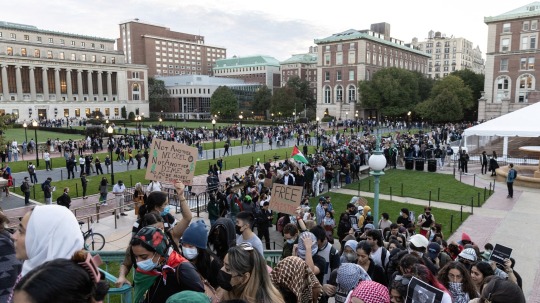
On Friday, after the encampment had been cleared, a lot of supporters stayed on the lawn, singing and giving speeches. Eric Lerner, who participated in the 1968 demonstrations as a Columbia undergrad, drove to the campus from his home in Warren, New Jersey, to encourage them. That evening, after the students took a prayer break—Shabbos for the Jews, Salat-al-Jum'a for the Muslims—Lerner addressed the crowd. “This is a historic step forward,” he said. “We have to escalate.” These days, Lerner is a physicist working on nuclear-fusion technology, which he sees as an extension of his anti-capitalist aims. (“Fusion,” he told the students, “is essential to socialism.”) Afterward, I reached him by phone. “Shafik isn’t interested in free speech,” he told me. “She was just trying to demonstrate to Congress that she’ll do their bidding.” Over the weekend, Columbia’s campus filled with encampments again, and some classes on Monday were held online to accommodate suspended students. There had already been rallies at Yale, the University of North Carolina, and the University of Michigan, in solidarity with the Columbia students, and there would be more to come. “The Vast Majority Of Youth Oppose This War,” Lerner Said. “Their Movement Will Only Grow From Here.” ♦
#Columbia University | Student Protests | Illegal Regime of the Zionist 🐗 🐖🐷🐖: Isra-hell | Isra-hellis 🐖🐷🐖🐗#Forever Palestine 🇵🇸 | Palestinians 🇵🇸🇵🇸🇵🇸 | Gaza | Gaza Genocide#The New Yorker
1 note
·
View note
Text
Pilates: A Holistic Approach to Fitness
Outline:
I. Introduction to Pilates
A. Origin and History
B. Principles of Pilates
II. Benefits of Pilates
A. Physical Benefits
1. Improved Core Strength
2. Increased Flexibility
3. Enhanced Posture
B. Mental Benefits
1. Stress Reduction
2. Mind-Body Connection
3. Increased Energy Levels
III. Different Types of Pilates
A. Mat Pilates
B. Reformer Pilates
C. Clinical Pilates
IV. Getting Started with Pilates
A. Finding a Qualified Instructor
B. Equipment Needed
C. Setting Realistic Goals
V. Common Misconceptions about Pilates
A. Pilates is Only for Women
B. Pilates is Only for the Flexible
C. Pilates Doesn't Offer Cardiovascular Benefits
VI. Tips for a Successful Pilates Practice
A. Consistency is Key
B. Listen to Your Body
C. Focus on Proper Form
VII. Pilates for Specific Populations
A. Pilates for Athletes
B. Pilates for Seniors
C. Pilates for Rehabilitation
you can this also can this product Pilates

VIII. Conclusion: Embracing the Pilates Lifestyle
Pilates has evolved from its humble beginnings into a globally recognized fitness phenomenon. Understanding its origin, principles, and myriad benefits is crucial for those considering adopting this transformative practice into their lifestyle.
Origin and History
Pilates, named after its founder Joseph Pilates, emerged in the early 20th century. Initially devised as a rehabilitation method for injured soldiers during World War I, Pilates quickly gained traction among dancers for its ability to enhance strength, flexibility, and body awareness. Today, it has transcended its origins to become a mainstream fitness modality embraced by individuals of all ages and backgrounds.
you can this also can this product Pilates

Principles of Pilates
Central to the philosophy of Pilates are its core principles: centering, concentration, control, precision, breath, and flow. These principles form the foundation of every Pilates exercise, emphasizing the importance of mindful movement and alignment.
Benefits of Pilates
The benefits of Pilates extend beyond physical fitness to encompass mental well-being and holistic health.
Physical Benefits
Improved Core Strength: Pilates targets the deep stabilizing muscles of the core, resulting in a strong and stable torso.
Increased Flexibility: Through a combination of stretching and strengthening exercises, Pilates enhances flexibility and joint mobility.
Enhanced Posture: Pilates promotes proper alignment and body awareness, leading to improved posture and reduced risk of injury.
Mental Benefits
Stress Reduction: The mindful nature of Pilates, coupled with focused breathing techniques, helps alleviate stress and promote relaxation.
Mind-Body Connection: Pilates encourages the integration of mind and body, fostering greater awareness and control over movement.
Increased Energy Levels: Regular Pilates practice boosts energy levels and promotes a sense of vitality and well-being.
Different Types of Pilates
Pilates encompasses various forms, each offering unique benefits and challenges.
Mat Pilates
Mat Pilates utilizes body weight resistance and simple props such as exercise bands and balls to perform a series of exercises on a mat. It focuses on developing core strength, flexibility, and overall body conditioning.
Reformer Pilates
Reformer Pilates involves the use of a specialized apparatus equipped with springs, straps, and a sliding carriage. It offers resistance and assistance, allowing for a full-body workout that targets specific muscle groups with precision and control.
Clinical Pilates
Clinical Pilates is a modified approach tailored to individuals with specific rehabilitation or therapeutic needs. It emphasizes controlled movements and proper alignment to address injuries, chronic pain, and musculoskeletal imbalances.
Getting Started with Pilates
Embarking on a Pilates journey requires careful consideration and planning.
Finding a Qualified Instructor
Selecting a certified Pilates instructor with expertise and experience is essential for a safe and effective practice. Look for instructors who have completed comprehensive training programs accredited by reputable Pilates organizations.
Equipment Needed
While some Pilates exercises can be performed with minimal equipment, others may require specialized apparatus such as a Pilates mat, reformer, or stability ball. Consult with your instructor to determine the appropriate equipment for your needs and goals.
Setting Realistic Goals
Establishing clear and achievable goals is vital for staying motivated and tracking progress. Whether you aim to improve strength, flexibility, or overall well-being, setting realistic expectations ensures a fulfilling Pilates experience.
Common Misconceptions about Pilates
Dispelling common myths surrounding Pilates is crucial for fostering a deeper understanding of its principles and benefits.
Pilates is Only for Women
Contrary to popular belief, Pilates is not exclusive to any gender. It is a holistic practice that caters to individuals of all ages, fitness levels, and backgrounds.
Pilates is Only for the Flexible
While flexibility is an integral component of Pilates, it is not a prerequisite. Pilates exercises can be modified to accommodate individuals of varying flexibility levels, making it accessible to everyone.
you can this also can this product Pilates

Pilates Doesn't Offer Cardiovascular Benefits
Although Pilates is primarily known for its focus on strength, flexibility, and posture, it can also provide cardiovascular benefits when performed at a moderate to high intensity. Incorporating dynamic movements and intervals into your Pilates routine can elevate your heart rate and improve cardiovascular health.
Tips for a Successful Pilates Practice
Achieving success in Pilates requires dedication, patience, and attention to detail.
Consistency is Key
Consistent practice is essential for reaping the full benefits of Pilates. Aim for regular sessions, ideally 2-3 times per week, to build strength, flexibility, and endurance progressively.
you can this also can this product Pilates
Listen to Your Body
Pay attention to your body's signals and modify exercises as needed to prevent injury and discomfort. Communicate openly with your instructor about any concerns or limitations you may have.
Focus on Proper Form
Maintaining proper form is paramount in Pilates to ensure safety and efficacy. Focus on alignment, engagement, and controlled movement throughout each exercise to maximize results and minimize risk of injury.
Pilates for Specific Populations
Pilates can be adapted to suit the needs of various populations, including athletes, seniors, and individuals undergoing rehabilitation.
Pilates for Athletes
Many athletes incorporate Pilates into their training regimen to improve performance, prevent injuries, and enhance recovery. Pilates targets specific muscle groups, improves flexibility, and promotes balance and coordination, making it an excellent complement to athletic pursuits.
Pilates for Seniors
Pilates offers numerous benefits for seniors, including improved balance, coordination, and joint mobility. Its low-impact nature and focus on controlled movements make it suitable for older adults looking to maintain or enhance their physical function and quality of life.
you can this also can this product Pilates
Pilates for Rehabilitation
Pilates-based rehabilitation programs are increasingly recognized for their effectiveness in treating a wide range of musculoskeletal conditions, injuries, and chronic pain. Under the guidance of a qualified instructor or physical therapist, Pilates can aid in recovery, restore mobility, and prevent future injuries.
Conclusion: Embracing the Pilates Lifestyle
Incorporating Pilates into your fitness routine can lead to transformative changes in both body and mind. By embracing its principles, practicing with consistency and intention, and seeking guidance from qualified instructors, you can experience the countless benefits of Pilates and embark on
Dislaimer
There are an affiliate link of a best product in this articale wich may make some profit for me
0 notes
Text
The International Scale of River Difficulty

Kayakers and canoe enthusiasts should familiarize themselves with the International Scale of River Difficulty, which describes the challenge posed to paddlers by different waterways. The scale includes six categories of difficulty.
Beginners are best suited to Class I and Class II rapids. Neither class presents much of a challenge: waves are small and infrequent, there are few obstructions and those present are easily seen and navigated, and self-rescue is easy in the event of capsizing. Paddlers may require some training in order to negotiate challenges on Class II rapids, especially those designated as Class II+.
Class III and Class IV rapids are considered intermediate and advanced, respectively. Class III is the first level at which rivers can swamp an open canoe, meaning the entire craft is submerged. Tight passages and ledges force paddlers to navigate narrow, complex passages. By Class IV, any person who falls overboard is at risk, injury and coordinated group efforts are frequently required for rescue.
Class V is the last standard rating for rivers. These rivers are characterized by long, heavily obstructed, or extremely powerful rapids and should only be attempted by expert paddlers. Individuals must be both technically skilled and physically fit. If possible, paddlers should scout the route beforehand.
Class VI rivers are considered “extreme and exploratory rapids.” In most cases, Class VI rivers have never been attempted, and a river may be downgraded to Class V after a team successfully documents a voyage. These rivers should only be attempted by world-class paddlers under ideal conditions, following extensive scouting. The risk of injury or death to paddlers who fall overboard is significant.
0 notes
Text
The Most Effective Ways for Adjusting to Life in a New Country
Moving to a new country is a daunting task considering the physical as well as mental demands that it requires on our part. It could drain us of money and dry up our emotional faculties. The latter is a concern for many these days since the homesickness and anxiety associated with moving to a new country are often tough to deal with.
There is an equal excitement for experiencing the unknown as well as a fear for unfamiliar surroundings, among expats.
Thus adjusting to new life in a country requires a blend of patience, open-mindedness, and pro-active efforts. International moving companies in UAE often find it their responsibility to counsel their clients to prepare them for better adjustments to the new environment.
Here we will try to have a better picture of the effective ways to adjust to life in a new country.
Cultural Awareness and Sensitivity
It is recommended by best movers UAE to know one or two things about the cultural landscapes of the host country in advance. Making your own research will also come in handy in making first impressions on the natives.
Learning the local language is another thing which could help you in easy adjustments in the new country. It is understandable that it will take time to learn an entirely alien language. And a language is best understood with proper usage among the natives. In that way, you will also pick up the local dialects. Having said that learning phrases like ‘Hello’, ‘Thank You’, etc in advance can make a better impression on the local people. Efforts to blend with the local milieu will be appreciated by them.
Engaging in cultural immersion activities such as festivals, local events, and traditions could accelerate your adjustment to life in the new country.
Establishing a Support System
Expat communities or international groups could provide you with a robust support system to cope with the challenges in the new environment. International moving companies in UAE could connect you with their client base as well. Expats who are already settled in your host country could guide you through hacks to effectively survive in the country.
Connections with natives are also beneficial to gain insights into the local milieu. As a result, you will be able to effortlessly navigate through the three phases in adaptation vis honeymoon phase, negotiation phase, and adjustment phase.
Connecting online is a novel trend in building an effective support system.
Exploring and Adapting to the new environment
Sitting idle at your home minding business alone will not take you through the three stages mentioned above. For that, you need to explore your neighborhood. Finding time for a family outing or meet-ups in the neighborhood will help you familiarise yourself with the new environment.
Adjusting to the climate and natural surroundings of the host country is another thing that will take some time.
Maintaining Connection with home
Relocating to a new country with the help of best movers UAE doesn’t mean that you should forget your home country and its culture. Maintaining ties with your original culture will help you in dealing with the torments of homesickness. Moreover, it is an approach that could give you a cosmopolitan identity in today’s concept of the global village.
In a nutshell, your proactive efforts to merge with the new environments matter in your journey through phases of adjustment in the host country. International moving companies in UAE such as Pack2Go will be a helping hand in guiding you through the entire stage of relocation and settling in the new locality. With their experience in this field for a while, they are able to provide you with comforting assistance in your adjustment phase.
0 notes
Text
Respecting the Invisible: Skilled Offense World Washing in North Carolina
Crime scenes evoke intense thoughts and leave behind a complex aftermath that runs beyond the original investigation. In North Carolina, as in any other state, the repair of influenced rooms is just a critical component of the healing method for towns and people handled by tragedy. Offense world washing solutions perform an essential position in that recovery, providing qualified, empathetic, and complete options to deal with the aftermath of offender incidents. suicide cleaning services North Carolina
I. The Importance of Quick Answer:
Quick result is a must in offense scene cleanup, and North Carolina people benefit from particular groups that understand the desperation of these work. Quick cleanup not only assists decrease the emotional effect on the community but also assures that possibly dangerous resources are handled properly and efficiently.
II. Empathy in Activity:
Offense world cleanup goes beyond only washing physical remnants; it involves a sensitive stability of professionalism and compassion. In North Carolina, washing groups are experienced to approach their work with consideration, knowing the mental toll such functions may have on those directly or indirectly affected. This caring method fosters a sense of confidence and understanding all through a difficult time.
III. Compliance with Regulations:
Offense views often require biohazardous products that need careful managing and disposal in adherence to rigid regulations. Cleaning services in North Carolina are well-versed in regional and federal directions, ensuring that they run within the bounds of what the law states to promise the security of equally their staff members and the community.
IV. Detailed Repair:
Beyond clearing up bodily traces, crime world cleaning services in North Carolina present detailed restoration. This includes smell treatment, sanitization, and, if required, reconstruction of affected areas. The target is to return the room to its pre-incident state, allowing towns to go ahead with the healing process.
V. Specialized Teaching and Experience:
Experts in offense scene cleaning undergo rigorous teaching to take care of the unique difficulties sat by different crime scenes. Whether working with biohazards, stress views, or harmful products, North Carolina washing teams are equipped with the data and experience required to address each situation effectively.
VI. Promoting Legislation Enforcement:
Offense world cleanup solutions work hand-in-hand with police agencies, ensuring that the washing method aligns easily with investigative procedures. This collaborative energy helps in sustaining the reliability of the research while also expediting the restoration of affected areas.
Realization:
In North Carolina, crime world cleaning companies perform a crucial role in restoring purchase and aiding communities in their trip toward healing. The mixture of fast response, compassion, regulatory compliance, and specialized knowledge makes these services important in the aftermath of offender incidents. By concentrating on comprehensive restoration, cleanup clubs lead significantly to the resilience and healing of towns afflicted with tragedy.
0 notes